77 interesting medical research topics for 2024
Last updated
25 November 2023
Reviewed by
Brittany Ferri, PhD, OTR/L
Medical research is the gateway to improved patient care and expanding our available treatment options. However, finding a relevant and compelling research topic can be challenging.
Use this article as a jumping-off point to select an interesting medical research topic for your next paper or clinical study.
- How to choose a medical research topic
When choosing a research topic , it’s essential to consider a couple of things. What topics interest you? What unanswered questions do you want to address?
During the decision-making and brainstorming process, here are a few helpful tips to help you pick the right medical research topic:

Focus on a particular field of study
The best medical research is specific to a particular area. Generalized studies are often too broad to produce meaningful results, so we advise picking a specific niche early in the process.
Maybe a certain topic interests you, or your industry knowledge reveals areas of need.
Look into commonly researched topics
Once you’ve chosen your research field, do some preliminary research. What have other academics done in their papers and projects?
From this list, you can focus on specific topics that interest you without accidentally creating a copycat project. This groundwork will also help you uncover any literature gaps—those may be beneficial areas for research.
Get curious and ask questions
Now you can get curious. Ask questions that start with why, how, or what. These questions are the starting point of your project design and will act as your guiding light throughout the process.
For example:
What impact does pollution have on children’s lung function in inner-city neighborhoods?
Why is pollution-based asthma on the rise?
How can we address pollution-induced asthma in young children?
- 77 medical research topics worth exploring in 2023
Need some research inspiration for your upcoming paper or clinical study? We’ve compiled a list of 77 topical and in-demand medical research ideas. Let’s take a look.
- Exciting new medical research topics
If you want to study cutting-edge topics, here are some exciting options:
COVID-19 and long COVID symptoms
Since 2020, COVID-19 has been a hot-button topic in medicine, along with the long-term symptoms in those with a history of COVID-19.
Examples of COVID-19-related research topics worth exploring include:
The long-term impact of COVID-19 on cardiac and respiratory health
COVID-19 vaccination rates
The evolution of COVID-19 symptoms over time
New variants and strains of the COVID-19 virus
Changes in social behavior and public health regulations amid COVID-19
Vaccinations
Finding ways to cure or reduce the disease burden of chronic infectious diseases is a crucial research area. Vaccination is a powerful option and a great topic to research.
Examples of vaccination-related research topics include:
mRNA vaccines for viral infections
Biomaterial vaccination capabilities
Vaccination rates based on location, ethnicity, or age
Public opinion about vaccination safety
Artificial tissues fabrication
With the need for donor organs increasing, finding ways to fabricate artificial bioactive tissues (and possibly organs) is a popular research area.
Examples of artificial tissue-related research topics you can study include:
The viability of artificially printed tissues
Tissue substrate and building block material studies
The ethics and efficacy of artificial tissue creation
- Medical research topics for medical students
For many medical students, research is a big driver for entering healthcare. If you’re a medical student looking for a research topic, here are some great ideas to work from:
Sleep disorders
Poor sleep quality is a growing problem, and it can significantly impact a person’s overall health.
Examples of sleep disorder-related research topics include:
How stress affects sleep quality
The prevalence and impact of insomnia on patients with mental health conditions
Possible triggers for sleep disorder development
The impact of poor sleep quality on psychological and physical health
How melatonin supplements impact sleep quality
Alzheimer’s and dementia
Cognitive conditions like dementia and Alzheimer’s disease are on the rise worldwide. They currently have no cure. As a result, research about these topics is in high demand.
Examples of dementia-related research topics you could explore include:
The prevalence of Alzheimer’s disease in a chosen population
Early onset symptoms of dementia
Possible triggers or causes of cognitive decline with age
Treatment options for dementia-like conditions
The mental and physical burden of caregiving for patients with dementia
- Lifestyle habits and public health
Modern lifestyles have profoundly impacted the average person’s daily habits, and plenty of interesting topics explore its effects.
Examples of lifestyle and public health-related research topics include:
The nutritional intake of college students
The impact of chronic work stress on overall health
The rise of upper back and neck pain from laptop use
Prevalence and cause of repetitive strain injuries (RSI)
- Controversial medical research paper topics
Medical research is a hotbed of controversial topics, content, and areas of study.
If you want to explore a more niche (and attention-grabbing) concept, here are some controversial medical research topics worth looking into:
The benefits and risks of medical cannabis
Depending on where you live, the legalization and use of cannabis for medical conditions is controversial for the general public and healthcare providers.
Examples of medical cannabis-related research topics that might grab your attention include:
The legalization process of medical cannabis
The impact of cannabis use on developmental milestones in youth users
Cannabis and mental health diagnoses
CBD’s impact on chronic pain
Prevalence of cannabis use in young people
The impact of maternal cannabis use on fetal development
Understanding how THC impacts cognitive function
Human genetics
The Human Genome Project identified, mapped, and sequenced all human DNA genes. Its completion in 2003 opened up a world of exciting and controversial studies in human genetics.
Examples of human genetics-related research topics worth delving into include:
Medical genetics and the incidence of genetic-based health disorders
Behavioral genetics differences between identical twins
Genetic risk factors for neurodegenerative disorders
Machine learning technologies for genetic research
Sexual health studies
Human sexuality and sexual health are important (yet often stigmatized) medical topics that need new research and analysis.
As a diverse field ranging from sexual orientation studies to sexual pathophysiology, examples of sexual health-related research topics include:
The incidence of sexually transmitted infections within a chosen population
Mental health conditions within the LGBTQIA+ community
The impact of untreated sexually transmitted infections
Access to safe sex resources (condoms, dental dams, etc.) in rural areas
- Health and wellness research topics
Human wellness and health are trendy topics in modern medicine as more people are interested in finding natural ways to live healthier lifestyles.
If this field of study interests you, here are some big topics in the wellness space:
Gluten sensitivity
Gluten allergies and intolerances have risen over the past few decades. If you’re interested in exploring this topic, your options range in severity from mild gastrointestinal symptoms to full-blown anaphylaxis.
Some examples of gluten sensitivity-related research topics include:
The pathophysiology and incidence of Celiac disease
Early onset symptoms of gluten intolerance
The prevalence of gluten allergies within a set population
Gluten allergies and the incidence of other gastrointestinal health conditions
Pollution and lung health
Living in large urban cities means regular exposure to high levels of pollutants.
As more people become interested in protecting their lung health, examples of impactful lung health and pollution-related research topics include:
The extent of pollution in densely packed urban areas
The prevalence of pollution-based asthma in a set population
Lung capacity and function in young people
The benefits and risks of steroid therapy for asthma
Pollution risks based on geographical location
Plant-based diets
Plant-based diets like vegan and paleo diets are emerging trends in healthcare due to their limited supporting research.
If you’re interested in learning more about the potential benefits or risks of holistic, diet-based medicine, examples of plant-based diet research topics to explore include:
Vegan and plant-based diets as part of disease management
Potential risks and benefits of specific plant-based diets
Plant-based diets and their impact on body mass index
The effect of diet and lifestyle on chronic disease management
Health supplements
Supplements are a multi-billion dollar industry. Many health-conscious people take supplements, including vitamins, minerals, herbal medicine, and more.
Examples of health supplement-related research topics worth investigating include:
Omega-3 fish oil safety and efficacy for cardiac patients
The benefits and risks of regular vitamin D supplementation
Health supplementation regulation and product quality
The impact of social influencer marketing on consumer supplement practices
Analyzing added ingredients in protein powders
- Healthcare research topics
Working within the healthcare industry means you have insider knowledge and opportunity. Maybe you’d like to research the overall system, administration, and inherent biases that disrupt access to quality care.
While these topics are essential to explore, it is important to note that these studies usually require approval and oversight from an Institutional Review Board (IRB). This ensures the study is ethical and does not harm any subjects.
For this reason, the IRB sets protocols that require additional planning, so consider this when mapping out your study’s timeline.
Here are some examples of trending healthcare research areas worth pursuing:
The pros and cons of electronic health records
The rise of electronic healthcare charting and records has forever changed how medical professionals and patients interact with their health data.
Examples of electronic health record-related research topics include:
The number of medication errors reported during a software switch
Nurse sentiment analysis of electronic charting practices
Ethical and legal studies into encrypting and storing personal health data
Inequities within healthcare access
Many barriers inhibit people from accessing the quality medical care they need. These issues result in health disparities and injustices.
Examples of research topics about health inequities include:
The impact of social determinants of health in a set population
Early and late-stage cancer stage diagnosis in urban vs. rural populations
Affordability of life-saving medications
Health insurance limitations and their impact on overall health
Diagnostic and treatment rates across ethnicities
People who belong to an ethnic minority are more likely to experience barriers and restrictions when trying to receive quality medical care. This is due to systemic healthcare racism and bias.
As a result, diagnostic and treatment rates in minority populations are a hot-button field of research. Examples of ethnicity-based research topics include:
Cancer biopsy rates in BIPOC women
The prevalence of diabetes in Indigenous communities
Access inequalities in women’s health preventative screenings
The prevalence of undiagnosed hypertension in Black populations
- Pharmaceutical research topics
Large pharmaceutical companies are incredibly interested in investing in research to learn more about potential cures and treatments for diseases.
If you’re interested in building a career in pharmaceutical research, here are a few examples of in-demand research topics:
Cancer treatment options
Clinical research is in high demand as pharmaceutical companies explore novel cancer treatment options outside of chemotherapy and radiation.
Examples of cancer treatment-related research topics include:
Stem cell therapy for cancer
Oncogenic gene dysregulation and its impact on disease
Cancer-causing viral agents and their risks
Treatment efficacy based on early vs. late-stage cancer diagnosis
Cancer vaccines and targeted therapies
Immunotherapy for cancer
Pain medication alternatives
Historically, opioid medications were the primary treatment for short- and long-term pain. But, with the opioid epidemic getting worse, the need for alternative pain medications has never been more urgent.
Examples of pain medication-related research topics include:
Opioid withdrawal symptoms and risks
Early signs of pain medication misuse
Anti-inflammatory medications for pain control
- Identify trends in your medical research with Dovetail
Are you interested in contributing life-changing research? Today’s medical research is part of the future of clinical patient care.
As your go-to resource for speedy and accurate data analysis , we are proud to partner with healthcare researchers to innovate and improve the future of healthcare.
Should you be using a customer insights hub?
Do you want to discover previous research faster?
Do you share your research findings with others?
Do you analyze research data?
Start for free today, add your research, and get to key insights faster
Editor’s picks
Last updated: 11 January 2024
Last updated: 15 January 2024
Last updated: 17 January 2024
Last updated: 12 May 2023
Last updated: 30 April 2024
Last updated: 18 May 2023
Last updated: 25 November 2023
Last updated: 13 May 2024
Latest articles
Related topics, .css-je19u9{-webkit-align-items:flex-end;-webkit-box-align:flex-end;-ms-flex-align:flex-end;align-items:flex-end;display:-webkit-box;display:-webkit-flex;display:-ms-flexbox;display:flex;-webkit-flex-direction:row;-ms-flex-direction:row;flex-direction:row;-webkit-box-flex-wrap:wrap;-webkit-flex-wrap:wrap;-ms-flex-wrap:wrap;flex-wrap:wrap;-webkit-box-pack:center;-ms-flex-pack:center;-webkit-justify-content:center;justify-content:center;row-gap:0;text-align:center;max-width:671px;}@media (max-width: 1079px){.css-je19u9{max-width:400px;}.css-je19u9>span{white-space:pre;}}@media (max-width: 799px){.css-je19u9{max-width:400px;}.css-je19u9>span{white-space:pre;}} decide what to .css-1kiodld{max-height:56px;display:-webkit-box;display:-webkit-flex;display:-ms-flexbox;display:flex;-webkit-align-items:center;-webkit-box-align:center;-ms-flex-align:center;align-items:center;}@media (max-width: 1079px){.css-1kiodld{display:none;}} build next, decide what to build next.

Users report unexpectedly high data usage, especially during streaming sessions.

Users find it hard to navigate from the home page to relevant playlists in the app.

It would be great to have a sleep timer feature, especially for bedtime listening.

I need better filters to find the songs or artists I’m looking for.
Log in or sign up
Get started for free
Explore the Best Medical and Health Research Topics Ideas
Table of contents
- 1 How to Choose Medical Research Paper Topics
- 2 New Medical Research Paper Topics
- 3 Medical Research Topics for College Students
- 4 Controversial Medical Topics for Research Paper
- 5 Health Research Topics
- 6 Medicine Research Topics
- 7 Healthcare Research Topics
- 8 Public Health Research Topics
- 9 Mental Health Research Paper Topics
- 10 Anatomy Research Topics
- 11 Biomedical Research Topics
- 12 Bioethics Research Topics
- 13 Cancer Research Topics
- 14 Clinical Research Topics
- 15 Critical Care Research Topics
- 16 Pediatric Research Topics
- 17 Dental Research Topics Ideas
- 18 Dermatology Research Topics
- 19 Primary Care Research Topics
- 20 Pharmaceutical Research Topics
- 21 Medical Anthropology Research Topics
- 22 Paramedic Research Paper Topics
- 23 Surgery Research Topics
- 24 Radiology Research Paper Topics
- 25 Anatomy and Physiology Research Paper Topics
- 26 Healthcare Management Research Paper Topics
- 27 Medical Ethics Research Paper Topics
- 28 Conclusion
In such a complex and broad field as medicine, writing an original and compelling research paper is a daunting task. From investigating public care concerns to cancer treatment studies, each student decides where his interests lie. Our goal is to help students find new angles to study and focus on relevant topics. With our resources, you can write an engaging and rigorous paper.
How to Choose Medical Research Paper Topics
Choosing good research paper topics is often more challenging than the writing process itself. You need to select a captivating subject matter that will grab the reader’s attention, showcase your knowledge of a specific field, help you progress in your studies, and perhaps even inspire future research.
To accomplish that, you need to start with brainstorming, followed by thorough research. Here are some great tips to follow:
- Pick an interesting topic – The key is to pick something that you find interesting, and yet make sure it’s not too general or too narrow. It should allow you to delve deep into the subject matter and show that you’re a professional who is ready to take on a challenge when it comes to your chosen field of medicine.
- Narrow down your focus – Once you have a list of potential topics, sift through recent medical research papers to get up-to-date with the latest trends, developments, and issues in medicine and healthcare. Check out textbooks, news articles, and other relevant sources for more information related to your potential topics. If a particular condition or disease interests you (perhaps something that drew you to a career in medicine), there’s your cue for narrowing down your topic.
- Pinpoint the “why,” “how,” and “what” – Whether you are looking into nutrition research paper topics , controversial medical topics, nursing research topics, or anything in-between, ask yourself why each of them is important. How could they contribute to the available medical studies, if any? What new information could they bring to improve the future of medicine? Asking these questions will help you pick the right medical research paper topic that suits you and helps you move forward and reach your aspirations.
To help you on that quest, we’ve compiled a list of topics that you could use or that might inspire you to come up with something unique. Let’s dive in.
New Medical Research Paper Topics
Are you interested in the newest and most interesting developments in medicine? We put hours of effort into identifying the current trends in health research so we could provide you with these examples of topics. Whether you hire a research paper writing service for students or write a paper by yourself, you need an appealing topic to focus on.
- Epidemics versus pandemics
- Child health care
- Medical humanitarian missions in the developing world
- Homoeopathic medicines – the placebo effect
- Virus infections – causes and treatment
- Is medical research on animals ethical
- Vaccination – dangers versus benefits
- Artificial tissues and organs
- Rare genetic diseases
- Brain injuries
Medical Research Topics for College Students
You don’t know where to start with your medical research paper? There are so many things you could write about that the greatest challenge is to narrow them down. This is why we decided to help.
- Antibiotics treatments
- Chronic diseases
- Palliative treatment
- Battling Alzheimer’s disease
- How modern lifestyle affects public health
- Professional diseases
- Sleep disorders
- Changes in physical and mental health due to aging
- Eating disorders
- Terminal diseases
Controversial Medical Topics for Research Paper
In healthcare, new discoveries can change people’s lives in the blink of an eye. This is also the reason why there are so many controversial topics in medicine, which involve anything from religion to ethics or social responsibility. Read on to discover our top controversial research topics.
- Implementing food standards
- Gluten allergy
- Assisted suicide for terminal patients
- Testing vaccines on animals – ethical concerns
- Moral responsibilities regarding cloning
- Marijuana legalization for medical purposes
- Abortion – medical approaches
- Vegan diets – benefits and dangers
- Increased life expectancy: a burden on the healthcare system?
- Circumcision effects
Health Research Topics
Students conducting health research struggle with finding good ideas related to their medical interests. If you want to write interesting college papers, you can select a good topic for our list.
- How environmental changes affect human health
- Deafness: communication disorders
- Household air pollution
- Diabetes – a public danger
- Coronaviruses
- Oral health assessment
- Tobacco and alcohol control
- Diseases caused by lack of physical exercise
- How urban pollution affects respiratory diseases
- Healthy diets
Medicine Research Topics
Regardless of the requirements in your research assignment, you can write about something that is both engaging and useful in your future career. Choose a topic from below.
- Causes for the increasing cancer cases
- Insulin resistance
- How terrorism affects mental health
- AIDS/HIV – latest developments
- Treating pregnant women versus non-pregnant women
- Latest innovations in medical instruments
- Genetic engineering
- Successful treatment of mental diseases
- Is autism a disease
- Natural coma versus artificial coma
Healthcare Research Topics
Healthcare research includes political and social aspects, besides medical. For college students who want to explore how medicine is affected by society’s values or principles, we provide examples of topics for papers. Select yours from the list below.
- Government investment in healthcare services in the EU versus the USA
- Inequalities in healthcare assistance and services
- Electronic health records systems – pros and cons
- Can asylums treat mental issues
- Health care for prison inmates
- Equipment for improving treatment of AIDS
- Correlation between economic development and health care services across countries
- Impact of smoking on organs
- Heart attacks – causes and effects
- Breast cancer – recent developments
Public Health Research Topics
For current examples of public health topics, browse our list. We provide only original, researchable examples for which you can easily find supporting data and evidence.
- Public versus private hospitals
- Health care professionals – management principles
- Surgery failures – who is responsible
- What legal responsibilities has the hospital administration
- Patient service quality in public versus private hospitals
- What benefits national health care systems have
- Estimated costs of cancer treatments
- Public health in developing countries
- Banning tobacco ads – importance for public health
- Government solutions to the anti-vaccine’s movement
Mental Health Research Paper Topics
Mental health is one of the most complex areas of medicine, where things are never as clear as with other medical issues. This increases the research potential of the field with plenty of topics left for debate.
- Causes of anxiety disorders
- Bulimia versus anorexia
- Childhood trauma
- Mental health public policies
- Postpartum Depression
- Posttraumatic Stress Disorder
- Seasonal Affective Disorder
- Schizophrenia
Anatomy Research Topics
Anatomy covers everything about the human body and how it works. If you find that intriguing and want to pay for medical research paper, start by selecting a topic.
- Chemotherapy: how it affects the body
- Thyroid glands – functions in the body
- Human endocrine system
- Heart diseases
- How does the human muscular system develop
- Lymphatic system – importance
- Investigating genetic diseases
- Digestive system
Biomedical Research Topics
Biology and medicine often work together. For the newest changes in the biomedical field, check our topics.
- Alzheimer’s disease – paths for treatment
- Vaccines and drug development in the treatment of Ebola
- Antibiotic resistance
- Biological effects caused by aging
- Air pollution effects on health
- Infectious disease past versus present
- Regenerative medicine
- Biomedical diagnostics
- Biomedical technology
Bioethics Research Topics
A controversial area of medicine, bioethics is where you get the chance to add personal input to a research topic and come up with new insights. You could consider these subjects.
- Organ donation
- Alternative or complementary medicine
- Assisted suicide or the right to die
- Artificial insemination or surrogacy
- Chemical and biological warfare
- Contraception
- Environmental bioethics
- In Vitro fertilization
Cancer Research Topics
Are you writing a paper related to cancer causes, diagnosis, treatment or effects? Look below for a hot topic that it’s easy to research and important for medical advance.
- Ability of immune system cells to fight cancer
- Computational oncology
- Metastasis affected by drug resistance
- Stem cells – applications for cancer treatment
- Tumor microenvironment
- Obesity and age in cancer occurrence
- Early cancer detection – benefits
- Artificial intelligence predicting cancer
- Hematologic malignancies
- Pathogen-related cancers
Clinical Research Topics
Learn more about clinical medicine by conducting more in-depth research. We prepared for you a list of relevant issues to touch upon.
- Ethical concerns regarding research on human subjects
- Subject recruitment
- Budget preparation
- Human subject protection
- Clinical trials – financial support
- Clinical practices for health professionals
- Using vulnerable populations in clinical research
- Quality assurance in clinical research
- Academic clinical trials versus clinical trials units
- Data collection and management
Critical Care Research Topics
Critical care is a key area in medical studies. Explore these topics in your research paper to gain more valuable knowledge in this field. You can also get in contact with nursing research paper writers .
- Obesity and asthma – clinical manifestations
- Chronic obstructive pulmonary disease
- Rhythm analysis for cardiac arrest
- Traumatic brain injury – fluid resuscitation
- Hydrocortisone for multiple trauma patients
- Care and nutrition for critically ill adults
- Diagnosis of hypersensitivity pneumonitis
- Coma and sedation scales
- Artificial airways suctioning
- Arterial puncture and arterial line
Pediatric Research Topics
Any topic that refers to health care for children, pregnant women, mothers, and adolescents goes under pediatric care.
- Attention deficit hyperactivity disorder (ADHD)
- Congenital heart disease in newborns
- Adolescent medicine
- Neonatal medicine
- Rare diseases in children and teenagers
- Obesity and weight fluctuations
- Behavioral sleep problems in children
- Children with anemia
Dental Research Topics Ideas
Choose a topic on oral health or dental care from this list of the most interesting topics in the field.
- How smoking affects oral health
- Children’s risk for dental caries
- Dental anxiety
- Types of dental materials – new advances
- Bad breath bacteria
- How diabetes affects oral health
- Oral cancer
- Dental pain – types, causes
- Dental implants
- Oral health-related quality of life
Dermatology Research Topics
Find the best research topic for your dermatology paper among our examples.
- Atopic dermatitis
- Contact dermatitis
- Epidemiology behind uncommon skin disorders
- Cutaneous aging
- Risk factors of melanoma skin cancer
- Acne versus rosacea
- Genetic testing for skin conditions
- Effects of cosmetic agents on skin health
- Improving skin barrier with pharmaceutical agents
- Skin manifestations of autoimmune disorders
Primary Care Research Topics
Write a primary care paper that can demonstrate your research skills and interest in powerful scientific findings.
- Primary care for vulnerable/uninsured populations
- Interpersonal continuity in care treatment
- How primary care contributes to health systems
- Primary care delivery models
- Developments in family medicine
- Occupational/environmental health
- Pharmacotherapy approaches
- Formal allergy testing
- Oral contraception side effects
- Dietary or behavioral interventions for obesity management
Pharmaceutical Research Topics
Pharma students who need paper topics can use one from our list. We include all things related to pharmacy life.
- Drugs that can treat cancer
- Drug excretion
- Elimination rate constant
- Inflammatory stress drug treatment
- Aspirin poising
- Ibuprofen – dangers versus benefits
- Toxicodynamics
- Opioid use disorder
- Pharmacotherapy for schizophrenia
- Ketamine in depression treatment
Medical Anthropology Research Topics
Medical anthropology unites different areas of human knowledge. Find powerful ideas for a paper below.
- Cultural contexts regarding reproductive health
- Women sexuality
- Anthropological aspects of health care
- Contributions of social sciences to public health
- Euthanasia and medical ethics across cultures
- Health-related behavior in adults across cultures
- Transcultural nursing
- Forensic psychiatry
- Symptoms of Celiac Disease – a disease with no symptoms
- Nursing ethics
Paramedic Research Paper Topics
Topics for paramedic research must be based on evidence, data, statistics, or practical experience. Just like ours.
- Trends and statistics in EMS
- Disaster medicine
- Mass casualties
- Pandemics and epidemics
- Infection control
- Basic versus advanced life support
- Scene safety in EMS
- Shock management
- Motor vehicle accidents
Surgery Research Topics
Discover all the intricacies of surgeries that save lives by writing about our topics.
- Medical malpractice and legal issues
- Methicillin-resistant Staphylococcus aureus
- Pain management
- Perioperative nursing
- Wound management
- Colorectal cancer surgery
- Breast cancer surgery
- Minimally invasive surgeries
- Vascular disease
Radiology Research Paper Topics
Find a radiology topic related to your academic interests to write a successful paper.
- Using MRI to diagnose hepatic focal lesions
- Multidetector computer tomography
- Ultrasound elastography in breast cancer
- Assessing traumatic spinal cord injuries with MRI diffusion tensor imaging
- Sonographic imaging to detect male infertility
- Role of tomography in diagnosing cancer
- Brain tumor surgery with magnetic resonance imaging
- Bacterial meningitis imaging
Anatomy and Physiology Research Paper Topics
Any ideas for a medical research paper? We have included the most important topics for an anatomy and physiology paper.
- What role has the endocrine system
- Staphylococcus aureus
- Environmental factors that affect development of human muscular system
- What role has the lymphatic system
- An investigation of genetic diseases
- Explaining the aging process
- The digestive tract
- Effects of stress on cells and muscles
- Evolution of the human nervous system
- What role has the cardiovascular system
Healthcare Management Research Paper Topics
There are numerous topics you could write about when it comes to healthcare management. There’s a wide range of options to pick, from infrastructure, staff, and financial management to HR and patient management. Here are some of the top healthcare management research paper options.
- Medical talent acquisition and retention
- Best methods for enhancing preventative care measures
- The role of telemedicine in reinventing healthcare management
- Patient care and the ability to pay for healthcare
- Mid-level healthcare providers in the emergency department
- The opioid crisis: policies and programs
- Urgent care and walk-in clinics
- Hospital emergency management plan during an epidemic
- Hospital records management and patient privacy
- Financial crises: challenges and opportunities
Medical Ethics Research Paper Topics
Medical ethics is a field that opens the door to numerous compelling topics for research papers. Here are some of the most appealing ones you could tackle.
- Clinical research on humans
- Vaccines and immunization
- Religious beliefs in healthcare
- Euthanasia and physician-assisted suicide
- Ethical issues across cultures
- Amniocentesis or prenatal birth defect testing
- Medical malpractice and going back to work
- Racial and ethnic preferences and perceptions in organ donations
- Racial and ethnic disparities in healthcare
- Ethical concerns of AI in healthcare
If you need further assistance with your medical research paper, PapersOwl is here for you. Our expert writers can provide you with top-notch research and help you write an impressive paper. Contact us anytime, pick your writer, tell them more about your topic, and get a unique, plagiarism-free research paper with impeccable grammar and formatting.
Readers also enjoyed

WHY WAIT? PLACE AN ORDER RIGHT NOW!
Just fill out the form, press the button, and have no worries!
We use cookies to give you the best experience possible. By continuing we’ll assume you board with our cookie policy.
Research Topics & Ideas: Healthcare
100+ Healthcare Research Topic Ideas To Fast-Track Your Project

Finding and choosing a strong research topic is the critical first step when it comes to crafting a high-quality dissertation, thesis or research project. If you’ve landed on this post, chances are you’re looking for a healthcare-related research topic , but aren’t sure where to start. Here, we’ll explore a variety of healthcare-related research ideas and topic thought-starters across a range of healthcare fields, including allopathic and alternative medicine, dentistry, physical therapy, optometry, pharmacology and public health.
NB – This is just the start…
The topic ideation and evaluation process has multiple steps . In this post, we’ll kickstart the process by sharing some research topic ideas within the healthcare domain. This is the starting point, but to develop a well-defined research topic, you’ll need to identify a clear and convincing research gap , along with a well-justified plan of action to fill that gap.
If you’re new to the oftentimes perplexing world of research, or if this is your first time undertaking a formal academic research project, be sure to check out our free dissertation mini-course. In it, we cover the process of writing a dissertation or thesis from start to end. Be sure to also sign up for our free webinar that explores how to find a high-quality research topic.
Overview: Healthcare Research Topics
- Allopathic medicine
- Alternative /complementary medicine
- Veterinary medicine
- Physical therapy/ rehab
- Optometry and ophthalmology
- Pharmacy and pharmacology
- Public health
- Examples of healthcare-related dissertations
Allopathic (Conventional) Medicine
- The effectiveness of telemedicine in remote elderly patient care
- The impact of stress on the immune system of cancer patients
- The effects of a plant-based diet on chronic diseases such as diabetes
- The use of AI in early cancer diagnosis and treatment
- The role of the gut microbiome in mental health conditions such as depression and anxiety
- The efficacy of mindfulness meditation in reducing chronic pain: A systematic review
- The benefits and drawbacks of electronic health records in a developing country
- The effects of environmental pollution on breast milk quality
- The use of personalized medicine in treating genetic disorders
- The impact of social determinants of health on chronic diseases in Asia
- The role of high-intensity interval training in improving cardiovascular health
- The efficacy of using probiotics for gut health in pregnant women
- The impact of poor sleep on the treatment of chronic illnesses
- The role of inflammation in the development of chronic diseases such as lupus
- The effectiveness of physiotherapy in pain control post-surgery

Topics & Ideas: Alternative Medicine
- The benefits of herbal medicine in treating young asthma patients
- The use of acupuncture in treating infertility in women over 40 years of age
- The effectiveness of homoeopathy in treating mental health disorders: A systematic review
- The role of aromatherapy in reducing stress and anxiety post-surgery
- The impact of mindfulness meditation on reducing high blood pressure
- The use of chiropractic therapy in treating back pain of pregnant women
- The efficacy of traditional Chinese medicine such as Shun-Qi-Tong-Xie (SQTX) in treating digestive disorders in China
- The impact of yoga on physical and mental health in adolescents
- The benefits of hydrotherapy in treating musculoskeletal disorders such as tendinitis
- The role of Reiki in promoting healing and relaxation post birth
- The effectiveness of naturopathy in treating skin conditions such as eczema
- The use of deep tissue massage therapy in reducing chronic pain in amputees
- The impact of tai chi on the treatment of anxiety and depression
- The benefits of reflexology in treating stress, anxiety and chronic fatigue
- The role of acupuncture in the prophylactic management of headaches and migraines

Topics & Ideas: Dentistry
- The impact of sugar consumption on the oral health of infants
- The use of digital dentistry in improving patient care: A systematic review
- The efficacy of orthodontic treatments in correcting bite problems in adults
- The role of dental hygiene in preventing gum disease in patients with dental bridges
- The impact of smoking on oral health and tobacco cessation support from UK dentists
- The benefits of dental implants in restoring missing teeth in adolescents
- The use of lasers in dental procedures such as root canals
- The efficacy of root canal treatment using high-frequency electric pulses in saving infected teeth
- The role of fluoride in promoting remineralization and slowing down demineralization
- The impact of stress-induced reflux on oral health
- The benefits of dental crowns in restoring damaged teeth in elderly patients
- The use of sedation dentistry in managing dental anxiety in children
- The efficacy of teeth whitening treatments in improving dental aesthetics in patients with braces
- The role of orthodontic appliances in improving well-being
- The impact of periodontal disease on overall health and chronic illnesses

Tops & Ideas: Veterinary Medicine
- The impact of nutrition on broiler chicken production
- The role of vaccines in disease prevention in horses
- The importance of parasite control in animal health in piggeries
- The impact of animal behaviour on welfare in the dairy industry
- The effects of environmental pollution on the health of cattle
- The role of veterinary technology such as MRI in animal care
- The importance of pain management in post-surgery health outcomes
- The impact of genetics on animal health and disease in layer chickens
- The effectiveness of alternative therapies in veterinary medicine: A systematic review
- The role of veterinary medicine in public health: A case study of the COVID-19 pandemic
- The impact of climate change on animal health and infectious diseases in animals
- The importance of animal welfare in veterinary medicine and sustainable agriculture
- The effects of the human-animal bond on canine health
- The role of veterinary medicine in conservation efforts: A case study of Rhinoceros poaching in Africa
- The impact of veterinary research of new vaccines on animal health
Topics & Ideas: Physical Therapy/Rehab
- The efficacy of aquatic therapy in improving joint mobility and strength in polio patients
- The impact of telerehabilitation on patient outcomes in Germany
- The effect of kinesiotaping on reducing knee pain and improving function in individuals with chronic pain
- A comparison of manual therapy and yoga exercise therapy in the management of low back pain
- The use of wearable technology in physical rehabilitation and the impact on patient adherence to a rehabilitation plan
- The impact of mindfulness-based interventions in physical therapy in adolescents
- The effects of resistance training on individuals with Parkinson’s disease
- The role of hydrotherapy in the management of fibromyalgia
- The impact of cognitive-behavioural therapy in physical rehabilitation for individuals with chronic pain
- The use of virtual reality in physical rehabilitation of sports injuries
- The effects of electrical stimulation on muscle function and strength in athletes
- The role of physical therapy in the management of stroke recovery: A systematic review
- The impact of pilates on mental health in individuals with depression
- The use of thermal modalities in physical therapy and its effectiveness in reducing pain and inflammation
- The effect of strength training on balance and gait in elderly patients
Topics & Ideas: Optometry & Opthalmology
- The impact of screen time on the vision and ocular health of children under the age of 5
- The effects of blue light exposure from digital devices on ocular health
- The role of dietary interventions, such as the intake of whole grains, in the management of age-related macular degeneration
- The use of telemedicine in optometry and ophthalmology in the UK
- The impact of myopia control interventions on African American children’s vision
- The use of contact lenses in the management of dry eye syndrome: different treatment options
- The effects of visual rehabilitation in individuals with traumatic brain injury
- The role of low vision rehabilitation in individuals with age-related vision loss: challenges and solutions
- The impact of environmental air pollution on ocular health
- The effectiveness of orthokeratology in myopia control compared to contact lenses
- The role of dietary supplements, such as omega-3 fatty acids, in ocular health
- The effects of ultraviolet radiation exposure from tanning beds on ocular health
- The impact of computer vision syndrome on long-term visual function
- The use of novel diagnostic tools in optometry and ophthalmology in developing countries
- The effects of virtual reality on visual perception and ocular health: an examination of dry eye syndrome and neurologic symptoms
Topics & Ideas: Pharmacy & Pharmacology
- The impact of medication adherence on patient outcomes in cystic fibrosis
- The use of personalized medicine in the management of chronic diseases such as Alzheimer’s disease
- The effects of pharmacogenomics on drug response and toxicity in cancer patients
- The role of pharmacists in the management of chronic pain in primary care
- The impact of drug-drug interactions on patient mental health outcomes
- The use of telepharmacy in healthcare: Present status and future potential
- The effects of herbal and dietary supplements on drug efficacy and toxicity
- The role of pharmacists in the management of type 1 diabetes
- The impact of medication errors on patient outcomes and satisfaction
- The use of technology in medication management in the USA
- The effects of smoking on drug metabolism and pharmacokinetics: A case study of clozapine
- Leveraging the role of pharmacists in preventing and managing opioid use disorder
- The impact of the opioid epidemic on public health in a developing country
- The use of biosimilars in the management of the skin condition psoriasis
- The effects of the Affordable Care Act on medication utilization and patient outcomes in African Americans
Topics & Ideas: Public Health
- The impact of the built environment and urbanisation on physical activity and obesity
- The effects of food insecurity on health outcomes in Zimbabwe
- The role of community-based participatory research in addressing health disparities
- The impact of social determinants of health, such as racism, on population health
- The effects of heat waves on public health
- The role of telehealth in addressing healthcare access and equity in South America
- The impact of gun violence on public health in South Africa
- The effects of chlorofluorocarbons air pollution on respiratory health
- The role of public health interventions in reducing health disparities in the USA
- The impact of the United States Affordable Care Act on access to healthcare and health outcomes
- The effects of water insecurity on health outcomes in the Middle East
- The role of community health workers in addressing healthcare access and equity in low-income countries
- The impact of mass incarceration on public health and behavioural health of a community
- The effects of floods on public health and healthcare systems
- The role of social media in public health communication and behaviour change in adolescents
Examples: Healthcare Dissertation & Theses
While the ideas we’ve presented above are a decent starting point for finding a healthcare-related research topic, they are fairly generic and non-specific. So, it helps to look at actual dissertations and theses to see how this all comes together.
Below, we’ve included a selection of research projects from various healthcare-related degree programs to help refine your thinking. These are actual dissertations and theses, written as part of Master’s and PhD-level programs, so they can provide some useful insight as to what a research topic looks like in practice.
- Improving Follow-Up Care for Homeless Populations in North County San Diego (Sanchez, 2021)
- On the Incentives of Medicare’s Hospital Reimbursement and an Examination of Exchangeability (Elzinga, 2016)
- Managing the healthcare crisis: the career narratives of nurses (Krueger, 2021)
- Methods for preventing central line-associated bloodstream infection in pediatric haematology-oncology patients: A systematic literature review (Balkan, 2020)
- Farms in Healthcare: Enhancing Knowledge, Sharing, and Collaboration (Garramone, 2019)
- When machine learning meets healthcare: towards knowledge incorporation in multimodal healthcare analytics (Yuan, 2020)
- Integrated behavioural healthcare: The future of rural mental health (Fox, 2019)
- Healthcare service use patterns among autistic adults: A systematic review with narrative synthesis (Gilmore, 2021)
- Mindfulness-Based Interventions: Combatting Burnout and Compassionate Fatigue among Mental Health Caregivers (Lundquist, 2022)
- Transgender and gender-diverse people’s perceptions of gender-inclusive healthcare access and associated hope for the future (Wille, 2021)
- Efficient Neural Network Synthesis and Its Application in Smart Healthcare (Hassantabar, 2022)
- The Experience of Female Veterans and Health-Seeking Behaviors (Switzer, 2022)
- Machine learning applications towards risk prediction and cost forecasting in healthcare (Singh, 2022)
- Does Variation in the Nursing Home Inspection Process Explain Disparity in Regulatory Outcomes? (Fox, 2020)
Looking at these titles, you can probably pick up that the research topics here are quite specific and narrowly-focused , compared to the generic ones presented earlier. This is an important thing to keep in mind as you develop your own research topic. That is to say, to create a top-notch research topic, you must be precise and target a specific context with specific variables of interest . In other words, you need to identify a clear, well-justified research gap.
Need more help?
If you’re still feeling a bit unsure about how to find a research topic for your healthcare dissertation or thesis, check out Topic Kickstarter service below.

You Might Also Like:

15 Comments
I need topics that will match the Msc program am running in healthcare research please
Hello Mabel,
I can help you with a good topic, kindly provide your email let’s have a good discussion on this.
Can you provide some research topics and ideas on Immunology?
Thank you to create new knowledge on research problem verse research topic
Help on problem statement on teen pregnancy
This post might be useful: https://gradcoach.com/research-problem-statement/
can you provide me with a research topic on healthcare related topics to a qqi level 5 student
Please can someone help me with research topics in public health ?
Hello I have requirement of Health related latest research issue/topics for my social media speeches. If possible pls share health issues , diagnosis, treatment.
I would like a topic thought around first-line support for Gender-Based Violence for survivors or one related to prevention of Gender-Based Violence
Please can I be helped with a master’s research topic in either chemical pathology or hematology or immunology? thanks
Can u please provide me with a research topic on occupational health and safety at the health sector
Good day kindly help provide me with Ph.D. Public health topics on Reproductive and Maternal Health, interventional studies on Health Education
may you assist me with a good easy healthcare administration study topic
May you assist me in finding a research topic on nutrition,physical activity and obesity. On the impact on children
Submit a Comment Cancel reply
Your email address will not be published. Required fields are marked *
Save my name, email, and website in this browser for the next time I comment.
- Print Friendly
Editor's Choice: AI Could Mean Better Mental Health for All
- ATS International Conference: New Trials in Pulmonary and Critical Care May 19, 2024 Original Investigation Pamrevlumab for Idiopathic Pulmonary Fibrosis: The ZEPHYRUS-1 Randomized Clinical Trial Ganesh Raghu, MD; Luca Richeldi, MD; Evans R. Fernández Pérez, MD; et al Editorial When the Third Time Is Not the Charm—Trial Outcomes in Idiopathic Pulmonary Fibrosis Ana C. Zamora, MD; Victor E. Ortega, MD, PhD; Eva M. Carmona, MD, PhD
- Original Investigation Bisoprolol in Patients With Chronic Obstructive Pulmonary Disease at High Risk of Exacerbation: The BICS Randomized Clinical Trial Graham Devereux, MD; Seonaidh Cotton, PhD; Mintu Nath, PhD; et al Editorial β-Blockers in Chronic Obstructive Pulmonary Disease—Walking the Tightrope MeiLan K. Han, MD; Mark T. Dransfield, MD
- Original Investigation Acetaminophen for Prevention and Treatment of Organ Dysfunction in Critically Ill Patients With Sepsis: The ASTER Randomized Clinical Trial Lorraine B. Ware, MD; D. Clark Files, MD; Alpha Fowler, MD; et al
Just Published
- Acetaminophen for Prevention and Treatment of Organ Dysfunction Lorraine B. Ware, MD; et al. Original Investigation online first free access Lorraine B. Ware, MD; et al.
- Trial of Bisoprolol in COPD Graham Devereux, MD; et al. Original Investigation online first free access Graham Devereux, MD; et al. Editorial
- Pamrevlumab for Idiopathic Pulmonary Fibrosis Ganesh Raghu, MD; et al. Original Investigation online first free access Ganesh Raghu, MD; et al. Editorial
- Sex Differences in Primary Care–Based Chronic Kidney Disease Management Jorge A. Rodriguez, MD; et al. Research Letter online first free access Jorge A. Rodriguez, MD; et al.
- Mortality in Patients Hospitalized for COVID-19 vs Influenza in Fall-Winter 2023-2024 Yan Xie, PhD; et al. Research Letter online first Yan Xie, PhD; et al.
- Trial Outcomes in Idiopathic Pulmonary Fibrosis Ana C. Zamora, MD; et al. Editorial online first free access Ana C. Zamora, MD; et al.
- β-Blockers in COPD MeiLan K. Han, MD; et al. Editorial online first free access MeiLan K. Han, MD; et al.
- I Kept Crying Alexis Harmon, MD A Piece of My Mind online first Alexis Harmon, MD
- Fosamax Fractures Gregory Curfman, MD Viewpoint online first Gregory Curfman, MD
- Poetry and the Meaning of Care Rafael Campo, MD, MA Editor's Note online first Rafael Campo, MD, MA
- Blood Testing for Phosphatidylethanol Areej Mazhar, DO; et al. JAMA Diagnostic Test Interpretation online first has active quiz Areej Mazhar, DO; et al.
- Causal Inference and Effects of Interventions From Observational Studies in Medical Journals Issa J. Dahabreh, MD, ScD; et al. Special Communication online first free access has active quiz Issa J. Dahabreh, MD, ScD; et al. Editor's Note
- A 3-Year-Old With Gingival Hemorrhage and Musculoskeletal Pain Khanh Trinh, DMD; et al. JAMA Clinical Challenge online first has active quiz Khanh Trinh, DMD; et al.
- The Women’s Health Initiative Randomized Trials and Clinical Practice JoAnn E. Manson, MD, DrPH; et al. Review online first has active quiz JoAnn E. Manson, MD, DrPH; et al.
- Lower Gastrointestinal Hemorrhage Hira Imran, MD; et al. JAMA Clinical Guidelines Synopsis online first has active quiz Hira Imran, MD; et al.
Latest from the USPSTF
- USPSTF Recommendation: Screening for Breast Cancer
- USPSTF Recommendation: Primary Care Interventions to Prevent Child Maltreatment
- USPSTF Recommendation: Screening for Speech and Language Delay and Disorders
- 75,387 Views USPSTF Recommendation: Screening for Breast Cancer
- 29,181 Views Causal Inference and Effects of Interventions From Observational Studies in Medical Journals
- 28,741 Views The Women’s Health Initiative Randomized Trials and Clinical Practice
- 27,914 Views Interstitial Lung Disease
- 24,060 Views Blockbuster Obesity Drugs Have Potential New Uses
- 23,322 Views Effect of Tirzepatide on Maintenance of Weight Reduction
- 21,998 Views Aspirin vs Placebo as Adjuvant Therapy for Breast Cancer
- 21,451 Views Mortality in Patients Hospitalized for COVID-19 vs Influenza in Fall-Winter 2023-2024
- 20,431 Views Associations of Milestone Ratings and Certification Examination Scores With Patient Outcomes
- 20,049 Views Stewardship Prompts to Improve Antibiotic Selection for Pneumonia
- 726 Citations Antibody Response to 2-Dose SARS-CoV-2 mRNA Vaccine Series in Solid Organ Transplant Recipients
- 717 Citations Strengthening the Reporting of Observational Studies in Epidemiology Using Mendelian Randomization
- 631 Citations Pancreatic Cancer
- 623 Citations Updated Guidance on the Reporting of Race and Ethnicity in Medical and Science Journals
- 523 Citations Effect of 2 Inactivated SARS-CoV-2 Vaccines on Symptomatic COVID-19 Infection in Adults
- 448 Citations Association Between IL-6 Antagonists and Mortality Among Patients Hospitalized for COVID-19
- 414 Citations Association Between 3 Doses of mRNA COVID-19 Vaccine and Symptomatic Infection Caused by Omicron and Delta Variants
- 383 Citations Cerebral Venous Sinus Thrombosis With Thrombocytopenia After Ad26.COV2.S Vaccination
- 382 Citations Association of COVID-19 mRNA Vaccination With Hospitalizations and Disease Severity
- 378 Citations Myocarditis Cases Reported After mRNA-Based COVID-19 Vaccination in the US From December 2020 to August 2021
- Register for email alerts with links to free full-text articles
- Access PDFs of free articles
- Manage your interests
- Save searches and receive search alerts
- Privacy Policy

Home » 500+ Medical Research Topic Ideas
500+ Medical Research Topic Ideas
Table of Contents

Medical research plays a crucial role in advancing healthcare and improving human health. It involves the scientific study of various aspects of medicine and health, including the causes, prevention, diagnosis, and treatment of diseases. Medical research is a dynamic and ever-evolving field, with new discoveries and breakthroughs happening all the time. It encompasses a wide range of disciplines, from basic science to clinical research, and involves collaboration between scientists, doctors, and other healthcare professionals. In this article, we will explore some exciting new and latest medical research topic ideas that are currently trending in the field. These Research Topics cover a variety of areas, including genetics, infectious diseases, mental health, and more.
Medical Research Topic Ideas
Medical Research Topic Ideas are as follows:
- The efficacy of mindfulness meditation in reducing symptoms of depression and anxiety
- The effects of vitamin D supplementation on bone health in postmenopausal women
- The impact of social media on body image and eating disorders in adolescents
- The effectiveness of telemedicine in improving access to healthcare in rural communities
- The benefits and risks of long-term use of statins for cholesterol management
- The role of gut microbiota in the development of autoimmune diseases
- The potential of gene therapy for the treatment of genetic disorders
- The relationship between sleep disorders and cardiovascular disease
- The use of artificial intelligence in diagnosing and treating cancer
- The effect of exercise on cognitive function in older adults
- The impact of environmental factors on the development of asthma in children
- The effectiveness of cognitive-behavioral therapy for the treatment of PTSD in veterans
- The potential benefits of psychedelic-assisted therapy for the treatment of mental illness
- The relationship between diet and risk of developing type 2 diabetes
- The role of epigenetics in the development of psychiatric disorders
- The impact of COVID-19 on mental health and well-being
- The effectiveness of mindfulness-based stress reduction in improving quality of life in cancer patients
- The impact of childhood trauma on the development of mental illness in adulthood
- The benefits and risks of hormone replacement therapy for menopausal women
- The effect of music therapy on reducing symptoms of dementia in older adults
- The relationship between gut microbiota and obesity
- The impact of socioeconomic status on health outcomes
- The effectiveness of acupuncture in treating chronic pain
- The use of stem cells in regenerative medicine
- The impact of air pollution on respiratory health
- The potential of nanotechnology in drug delivery
- The relationship between social support and mental health
- The effectiveness of mindfulness-based interventions for addiction treatment
- The role of inflammation in the development of Alzheimer’s disease
- The use of virtual reality in pain management
- The impact of exercise on mental health in adolescents
- The effectiveness of group therapy for the treatment of substance abuse
- The relationship between sleep and weight management
- The benefits and risks of using medical marijuana for chronic pain management
- The role of the immune system in the development of autoimmune diseases
- The effectiveness of cognitive rehabilitation therapy for traumatic brain injury patients
- The impact of maternal stress on fetal development
- The relationship between physical activity and cardiovascular health
- The potential of gene editing for the treatment of genetic disorders
- The effectiveness of mindfulness-based interventions for reducing symptoms of postpartum depression.
- The impact of social media on mental health
- Investigating the use of virtual reality in pain management
- The effectiveness of mindfulness-based interventions for depression
- Exploring the relationship between sleep and anxiety
- Examining the efficacy of telemedicine in delivering mental health care
- Investigating the impact of environmental factors on the development of cancer
- The effect of exercise on cognitive function in elderly individuals
- Examining the potential benefits of psychedelic-assisted therapy for PTSD
- The relationship between diet and cardiovascular disease
- Investigating the impact of air pollution on respiratory health
- Examining the effects of social isolation on mental and physical health
- The use of machine learning in diagnosing medical conditions
- Investigating the effectiveness of acupuncture in pain management
- The impact of childhood trauma on mental and physical health outcomes in adulthood
- Examining the relationship between stress and autoimmune diseases
- The effect of music therapy on mental health outcomes
- Investigating the impact of gender on healthcare outcomes
- Examining the relationship between sleep apnea and cardiovascular disease
- The effectiveness of mindfulness-based interventions for chronic pain
- Investigating the potential benefits of medical marijuana for chronic pain management
- Examining the impact of climate change on infectious disease transmission
- The use of robotics in surgery
- Investigating the relationship between alcohol consumption and cancer risk
- The effect of meditation on blood pressure control
- Examining the impact of social determinants of health on healthcare outcomes
- The role of genetics in the development of mental health conditions
- Investigating the efficacy of cognitive-behavioral therapy for anxiety disorders
- Examining the relationship between inflammation and depression
- The impact of shift work on sleep and circadian rhythms
- Investigating the potential benefits of probiotics in gut health
- Examining the relationship between diet and mental health outcomes
- The effectiveness of art therapy for individuals with dementia
- Investigating the relationship between chronic pain and mental health outcomes
- The impact of artificial intelligence on medical diagnosis and treatment
- Examining the effectiveness of exercise in treating depression
- Investigating the relationship between inflammation and cardiovascular disease
- The effect of aromatherapy on anxiety and stress
- Examining the impact of social support on mental health outcomes
- The effectiveness of hypnotherapy in pain management.
- The role of gut microbiota in immune system modulation
- Effects of intermittent fasting on insulin sensitivity in obese individuals
- Impact of smartphone usage on sleep quality and quantity
- The potential therapeutic effects of CBD on anxiety disorders
- Association between shift work and cardiovascular disease
- Efficacy and safety of psychedelic-assisted psychotherapy in treating depression
- The relationship between stress and autoimmune diseases
- Novel therapies for Alzheimer’s disease
- The effects of high-intensity interval training on metabolic syndrome
- The role of epigenetics in the development of cancer
- The effectiveness of virtual reality in pain management
- The effects of social media on body image and eating disorders
- The association between air pollution and respiratory diseases
- Effects of mindfulness meditation on stress and anxiety in healthcare workers
- The potential benefits of ketogenic diet in treating epilepsy
- The relationship between sleep apnea and cardiovascular disease
- The impact of climate change on infectious disease outbreaks
- The effectiveness of exercise in preventing falls in the elderly
- The effects of blue light exposure on circadian rhythm and sleep quality
- The association between alcohol consumption and liver disease
- The effectiveness of cognitive-behavioral therapy in treating obsessive-compulsive disorder
- The role of gut-brain axis in mental health disorders
- The association between chronic inflammation and cancer
- The efficacy and safety of probiotics in treating irritable bowel syndrome
- The effects of social isolation on mental health in the elderly
- The impact of exercise on cognitive function in Parkinson’s disease patients
- The association between vitamin D deficiency and autoimmune diseases
- The potential therapeutic effects of music therapy in dementia patients
- The effects of second-hand smoke on cardiovascular health
- The association between maternal smoking and infant health outcomes
- The role of microbiome in the development of allergies
- The association between sleep duration and obesity
- The effects of blue light-blocking glasses on sleep quality and quantity
- The potential therapeutic effects of ketamine in treating depression
- The association between gut dysbiosis and inflammatory bowel disease
- The effectiveness of cognitive rehabilitation therapy in traumatic brain injury patients
- The impact of early childhood stress on adult mental health
- The role of inflammation in the development of type 2 diabetes
- The potential benefits of plant-based diets in preventing chronic diseases.
- The effects of exercise on cognitive function in aging adults
- The association between sleep disorders and cardiovascular disease
- The potential therapeutic effects of psilocybin in treating addiction
- The role of gut microbiota in the development of autism spectrum disorder
- The effectiveness of mindfulness-based interventions in treating depression
- The effects of air pollution on cognitive function
- The association between maternal mental health and child development
- The potential therapeutic effects of cannabis in treating chronic pain
- The role of diet in the prevention and management of diabetes
- The effects of social support on mental health in cancer patients
- The association between shift work and mental health disorders
- The efficacy of antiviral therapies in treating COVID-19
- The effects of exercise on bone health in postmenopausal women
- The association between sleep disorders and obesity
- The potential therapeutic effects of mindfulness meditation in treating anxiety disorders
- The role of gut microbiota in the development of metabolic disorders
- The effectiveness of virtual reality therapy in treating phobias
- The association between social support and immune system function
- The impact of early life stress on adult cardiovascular health
- The potential benefits of intermittent fasting in cancer prevention
- The effects of air pollution on pregnancy outcomes
- The association between maternal obesity and child health outcomes
- The efficacy of cognitive-behavioral therapy in treating post-traumatic stress disorder
- The effects of sedentary behavior on metabolic health
- The potential therapeutic effects of omega-3 fatty acids in treating depression
- The role of microbiome in the development of obesity
- The association between social isolation and cognitive decline in older adults
- The impact of environmental toxins on child development
- The potential benefits of plant-based diets in treating metabolic disorders
- The effects of sleep deprivation on cognitive function
- The association between maternal stress and fetal development
- The efficacy of pharmacological interventions in treating anxiety disorders
- The effects of air pollution on respiratory health in children
- The association between social support and cardiovascular health
- The potential therapeutic effects of mindfulness meditation in treating chronic pain
- The role of diet in the prevention and management of cardiovascular disease
- The effects of exercise on mental health in children and adolescents
- The association between social support and cancer survival rates
- The impact of environmental factors on epigenetic modifications and disease susceptibility.
- The effects of exercise on immune function
- The association between maternal obesity and infant health outcomes
- The impact of air pollution on cognitive function in children
- The association between sleep deprivation and mental health disorders
- The effectiveness of virtual reality in rehabilitation after stroke
- The role of the microbiome in the development of obesity
- The impact of noise pollution on cardiovascular health
- The association between depression and cardiovascular disease
- The association between periodontal disease and cardiovascular health
- The impact of social support on mental health outcomes in cancer patients
- The potential therapeutic effects of melatonin in treating sleep disorders
- The association between air pollution and cognitive decline in older adults
- The effectiveness of group therapy in treating social anxiety disorder
- The impact of exercise on bone health in postmenopausal women
- The association between alcohol consumption and breast cancer risk
- The effects of blue light exposure on melatonin secretion and sleep quality
- The potential therapeutic effects of stem cells in treating Parkinson’s disease
- The role of inflammation in the development of depression
- The association between gut dysbiosis and depression
- The effectiveness of music therapy in reducing anxiety in cancer patients
- The impact of social media on mental health in adolescents
- The potential therapeutic effects of ketamine in treating post-traumatic stress disorder
- The association between vitamin D deficiency and cardiovascular disease
- The effects of chronic stress on immune function
- The potential benefits of Mediterranean diet in preventing cardiovascular disease
- The impact of noise pollution on sleep quality and quantity
- The association between sedentary behavior and depression
- The effects of air pollution on fetal development and pregnancy outcomes
- The potential therapeutic effects of acupuncture in treating anxiety disorders
- The role of microbiome in the development of multiple sclerosis
- The effectiveness of mindfulness-based stress reduction in treating chronic pain
- The impact of artificial sweeteners on metabolic health
- The association between sleep duration and cardiovascular disease
- The effects of social isolation on immune function in older adults
- The potential therapeutic effects of omega-3 fatty acids in treating depression.
- The effects of exercise on cognitive function in older adults
- The association between maternal mental health and infant development
- The potential therapeutic effects of probiotics in treating depression
- The impact of air pollution on lung health in children
- The association between sleep quality and academic performance in adolescents
- The effectiveness of cognitive-behavioral therapy in treating insomnia
- The role of gut microbiota in the development of metabolic syndrome
- The potential therapeutic effects of ayahuasca in treating addiction
- The impact of green space on mental health in urban areas
- The association between sedentary behavior and cardiometabolic risk factors
- The effects of blue light on mood and cognitive performance in shift workers
- The potential benefits of vegan diets in preventing chronic diseases
- The impact of social support on mental health in older adults
- The association between air pollution and lung cancer risk
- The effects of exercise on mental health in cancer survivors
- The potential therapeutic effects of ketamine in treating bipolar disorder
- The role of the microbiome in the development of rheumatoid arthritis
- The association between maternal nutrition and fetal development
- The effects of sleep deprivation on immune function
- The potential benefits of mindfulness meditation in managing chronic pain
- The impact of noise pollution on sleep-disordered breathing
- The association between sedentary behavior and breast cancer risk
- The effects of blue light exposure on retinal health
- The potential therapeutic effects of deep brain stimulation in treating depression
- The role of gut microbiota in the development of non-alcoholic fatty liver disease
- The association between air pollution and neurodegenerative diseases
- The effects of social support on immune function in cancer patients
- The potential therapeutic effects of acupuncture in treating migraines
- The impact of light pollution on sleep quality and quantity
- The association between sedentary behavior and type 2 diabetes risk
- The effects of mindfulness meditation on cognitive function in older adults
- The potential benefits of the DASH diet in preventing hypertension
- The impact of social media on body dissatisfaction and eating disorders in adolescents
- The association between air pollution and kidney disease
- The effects of chronic stress on cardiovascular health
- The potential therapeutic effects of gene therapy in treating inherited diseases
- The role of microbiome in the development of atopic dermatitis
- The association between maternal smoking and childhood obesity
- The effects of blue light exposure on visual function and eye health
- The potential therapeutic effects of electroconvulsive therapy in treating depression.
Healthcare Research Topics for College Students
- The impact of healthcare policies on patient outcomes
- The effectiveness of telemedicine in improving access to healthcare
- The role of cultural competency in healthcare delivery
- The impact of social determinants of health on healthcare outcomes
- The effectiveness of different types of healthcare interventions
- The role of genetics in predicting and preventing chronic diseases
- The impact of the opioid epidemic on healthcare delivery
- The effectiveness of alternative medicine in managing chronic conditions
- The role of technology in improving patient safety
- The impact of healthcare provider burnout on patient care
- The effectiveness of different healthcare models in managing chronic diseases
- The role of patient education in improving healthcare outcomes
- The impact of healthcare disparities on access to care and health outcomes
- The effectiveness of healthcare systems in responding to public health emergencies
- The role of nutrition in disease prevention and management
- The impact of healthcare policy on healthcare costs and spending
- The effectiveness of mental health interventions in improving overall health outcomes
- The role of healthcare systems in addressing health disparities
- The impact of healthcare data analytics on clinical decision making
- The effectiveness of healthcare interventions in reducing healthcare-associated infections
- The role of patient-centered care in improving healthcare outcomes
- The impact of healthcare regulations on patient safety
- The effectiveness of vaccination programs in preventing infectious diseases
- The role of healthcare systems in promoting healthy lifestyle behaviors
- The impact of chronic diseases on healthcare costs and quality of life
- The effectiveness of preventative healthcare in improving health outcomes
- The role of healthcare technology in improving healthcare delivery
- The impact of healthcare funding on healthcare outcomes
- The effectiveness of healthcare interventions in managing chronic pain
- The role of healthcare providers in promoting health equity.
Community Medicine Research Topics for Medical Students
- The impact of community-based interventions on reducing the burden of non-communicable diseases in low-income communities.
- The effectiveness of vaccination campaigns in preventing infectious diseases in marginalized communities.
- The relationship between air pollution and respiratory health in urban communities.
- The prevalence and risk factors of substance abuse among homeless populations.
- The impact of social determinants of health on health outcomes in rural communities.
- The role of community health workers in improving maternal and child health outcomes in low-resource settings.
- The association between food insecurity and obesity in low-income populations.
- The prevalence and risk factors of mental health disorders among adolescents in urban communities.
- The effectiveness of school-based health promotion programs in improving health behaviors among children and adolescents.
- The role of community-based participatory research in addressing health disparities in underserved populations.
- The impact of social support networks on mental health outcomes among elderly populations.
- The relationship between access to healthcare services and health outcomes in rural communities.
- The effectiveness of smoking cessation interventions in reducing the burden of tobacco-related diseases.
- The prevalence and risk factors of sexually transmitted infections among young adults in urban communities.
- The role of community-based organizations in promoting healthy behaviors and preventing chronic diseases.
- The impact of climate change on the incidence and distribution of infectious diseases.
- The prevalence and risk factors of intimate partner violence among women in low-income communities.
- The effectiveness of health education programs in improving health literacy and health outcomes in underserved populations.
- The relationship between social support and adherence to treatment among patients with chronic diseases.
- The prevalence and risk factors of hypertension and diabetes in urban communities.
- The impact of community-based interventions on reducing healthcare costs and improving health outcomes.
- The role of mobile health technologies in improving access to healthcare services in rural communities.
- The prevalence and risk factors of obesity among children and adolescents in low-income communities.
- The effectiveness of community-based interventions in promoting healthy behaviors among pregnant women.
- The impact of housing conditions on health outcomes in marginalized communities.
- The relationship between access to healthy food and health outcomes in urban communities.
- The prevalence and risk factors of depression among elderly populations in rural communities.
- The role of social media in promoting healthy behaviors and preventing diseases among young adults.
- The effectiveness of telemedicine in improving access to healthcare services in underserved populations.
- The prevalence and risk factors of infectious diseases among migrant populations in urban areas.
Surgery Research Topics for Medical Students
- The efficacy and safety of minimally invasive surgery for various conditions
- Comparison of laparoscopic and open surgery for common procedures
- The impact of surgeon experience on surgical outcomes
- Analysis of postoperative complications and their management
- The role of robotics in surgery
- Investigating the use of artificial intelligence in surgery
- The effectiveness of non-pharmacological pain management techniques after surgery
- The effect of preoperative anxiety on postoperative recovery
- Evaluation of different surgical approaches for breast cancer treatment
- The benefits and risks of surgical treatment for obesity
- Investigating the use of stem cells in tissue repair following surgery
- The influence of nutrition on postoperative recovery and wound healing
- Analysis of the psychological impact of surgery on patients
- The effect of different anesthesia methods on postoperative outcomes
- Comparison of outcomes between day surgery and inpatient surgery
- Evaluation of the use of surgical checklists in improving patient safety
- The impact of age on surgical outcomes and recovery
- Investigating the use of 3D printing in surgical planning and implant design
- The benefits and risks of bariatric surgery in patients with diabetes
- The role of surgery in the treatment of chronic pain
- The efficacy of arthroscopic surgery for joint conditions
- The use of lasers in surgery
- Investigating the use of virtual reality in surgical training and education
- The effect of preoperative counseling on patient satisfaction and outcomes
- The impact of comorbidities on surgical outcomes
- Analysis of the economic impact of different surgical approaches
- Investigating the use of telemedicine in surgical consultations and follow-up care
- The effectiveness of surgical treatment for endometriosis
- Comparison of outcomes between single-incision and multiport laparoscopic surgery
- The use of robotics in urologic surgery.
Research Projects for Undergraduate Medical Students
- Investigating the role of genetics in the development of cancer
- Analyzing the effectiveness of different types of pain management strategies in postoperative patients
- Evaluating the impact of diet and exercise on obesity-related health outcomes
- Examining the relationship between sleep quality and mental health in medical students
- Investigating the efficacy of different types of antibiotics in treating common bacterial infections
- Analyzing the impact of electronic medical record systems on patient care
- Evaluating the effectiveness of different types of vaccines in preventing infectious diseases
- Examining the relationship between maternal nutrition and fetal development
- Investigating the use of telemedicine in delivering healthcare services to rural populations
- Analyzing the impact of smoking on lung function and respiratory health
- Evaluating the effectiveness of different types of rehabilitation programs for stroke patients
- Examining the relationship between physical activity and cardiovascular health
- Investigating the use of stem cells in treating various medical conditions
- Analyzing the impact of stress on mental and physical health outcomes
- Evaluating the effectiveness of different types of medical interventions in managing chronic pain
- Examining the relationship between social support and mental health outcomes in patients with chronic illnesses
- Investigating the use of mindfulness-based interventions in reducing anxiety and depression
- Analyzing the impact of environmental factors on health outcomes in urban populations
- Evaluating the effectiveness of different types of cancer treatments, such as chemotherapy, radiation therapy, and surgery
- Examining the relationship between nutrition and mental health in older adults
- Investigating the use of mobile health technologies in promoting healthy behaviors
- Analyzing the impact of air pollution on respiratory health in children
- Evaluating the effectiveness of different types of treatments for substance use disorders
- Examining the relationship between socioeconomic status and health outcomes
- Investigating the use of music therapy in managing pain and anxiety in hospitalized patients
- Analyzing the impact of social media on mental health outcomes in adolescents
- Evaluating the effectiveness of different types of interventions in managing symptoms of depression and anxiety in cancer patients
- Examining the relationship between sleep and cognitive function in older adults
- Investigating the use of animal-assisted therapy in promoting physical and mental health
- Analyzing the impact of climate change on health outcomes in vulnerable populations
About the author
Muhammad Hassan
Researcher, Academic Writer, Web developer
You may also like

200+ Funny Research Topics

500+ Sports Research Topics

300+ American History Research Paper Topics

500+ Cyber Security Research Topics

500+ Environmental Research Topics

500+ Economics Research Topics
An official website of the United States government
The .gov means it’s official. Federal government websites often end in .gov or .mil. Before sharing sensitive information, make sure you’re on a federal government site.
The site is secure. The https:// ensures that you are connecting to the official website and that any information you provide is encrypted and transmitted securely.
- Publications
- Account settings
Trending Articles
- An age-progressive platelet differentiation path from hematopoietic stem cells causes exacerbated thrombosis. Poscablo DM, et al. Cell. 2024. PMID: 38749423
- Andexanet for Factor Xa Inhibitor-Associated Acute Intracerebral Hemorrhage. Connolly SJ, et al. N Engl J Med. 2024. PMID: 38749032 Clinical Trial.
- ARID1A suppresses R-loop-mediated STING-type I interferon pathway activation of anti-tumor immunity. Maxwell MB, et al. Cell. 2024. PMID: 38754421
- Perioperative Nivolumab in Resectable Lung Cancer. Cascone T, et al. N Engl J Med. 2024. PMID: 38749033 Clinical Trial.
- Global burden and strength of evidence for 88 risk factors in 204 countries and 811 subnational locations, 1990-2021: a systematic analysis for the Global Burden of Disease Study 2021. GBD 2021 Risk Factors Collaborators. Lancet. 2024. PMID: 38762324
Latest Literature
- Am Heart J (1)
- Am J Clin Nutr (3)
- Arch Phys Med Rehabil (2)
- Cell Metab (1)
- Gastroenterology (1)
- J Biol Chem (11)
- Lancet (22)
NCBI Literature Resources
MeSH PMC Bookshelf Disclaimer
The PubMed wordmark and PubMed logo are registered trademarks of the U.S. Department of Health and Human Services (HHS). Unauthorized use of these marks is strictly prohibited.
Medical Research Paper Topics

This page provides a comprehensive list of medical research paper topics divided into 20 categories, each with 10 unique subjects. The categories span across various subfields, including anatomy and physiology, diseases, epidemiology, health and fitness, health disparities, healthcare, kinesiology, mental health, pharmacology, and veterinary medicine. Additionally, the page offers expert advice on choosing the right topic and crafting an impactful medical research paper. It also introduces iResearchNet’s writing services, which are designed to assist students in creating high-quality, custom medical research papers.
200 Medical Research Paper Topics:
Medical research is a vast and diverse field, offering a plethora of topics for students and researchers to explore. The choice of topic can significantly influence the direction of your research and the impact of your findings. Therefore, it’s crucial to choose a topic that not only interests you but also aligns with your academic and career goals. To assist you in this endeavor, we have compiled a comprehensive list of medical research paper topics, divided into 20 categories, each with 10 unique topics.
Academic Writing, Editing, Proofreading, And Problem Solving Services
Get 10% off with 24start discount code.
1. Anatomy and Physiology:
- The role of the lymphatic system in maintaining homeostasis.
- The impact of aging on muscle function and structure.
- The physiological effects of stress on the human body.
- The role of the endocrine system in metabolism.
- The impact of exercise on cardiovascular health.
- The role of the nervous system in sensation and perception.
- The physiological effects of sleep deprivation.
- The role of the digestive system in nutrient absorption.
- The impact of genetic factors on human physiology.
- The role of the immune system in disease prevention.
2. Diseases:
- The genetic and environmental factors contributing to the development of cancer.
- The impact of lifestyle factors on the prevalence of heart disease.
- The role of vaccination in the prevention of infectious diseases.
- The challenges in the management and treatment of diabetes.
- The impact of the human microbiome on disease development.
- The role of inflammation in the pathogenesis of autoimmune diseases.
- The challenges in the diagnosis and treatment of Alzheimer’s disease.
- The impact of antibiotic resistance on the treatment of bacterial infections.
- The role of genetic mutations in the development of rare diseases.
- The impact of viral evolution on the spread of infectious diseases.
3. Epidemiology:
- The impact of socioeconomic factors on the prevalence of infectious diseases.
- The role of vaccination in the prevention of disease outbreaks.
- The impact of climate change on the spread of vector-borne diseases.
- The role of epidemiological studies in the development of public health policies.
- The impact of population density on the spread of infectious diseases.
- The role of epidemiology in the identification of risk factors for chronic diseases.
- The impact of global travel on the spread of infectious diseases.
- The role of epidemiological data in the management of disease outbreaks.
- The impact of demographic factors on disease prevalence.
- The role of epidemiology in the study of health disparities.
4. Health and Fitness:
- The impact of physical activity on mental health.
- The role of diet in the prevention of chronic diseases.
- The impact of sedentary lifestyle on health.
- The role of physical fitness in the prevention of heart disease.
- The impact of obesity on health and lifespan.
- The role of exercise in the management of stress.
- The impact of nutrition on cognitive function.
- The role of physical activity in the management of chronic diseases.
- The impact of sleep on health and wellbeing.
- The role of lifestyle interventions in the prevention of diabetes.
5. Health Disparities:
- The impact of socioeconomic status on health outcomes.
- The role of healthcare access in health disparities.
- The impact of racial and ethnic disparities on health outcomes.
- The role of social determinants of health in health disparities.
- The impact of health literacy on health outcomes.
- The role of cultural competence in reducing health disparities.
- The impact of gender disparities on health outcomes.
- The role of health policy in addressing health disparities.
- The impact of environmental factors on health disparities.
- The role of education in reducing health disparities.
6. Healthcare:
- The impact of healthcare reform on patient outcomes.
- The role of telemedicine in improving healthcare access.
- The impact of health information technology on patient care.
- The role of healthcare quality in patient satisfaction.
- The impact of healthcare costs on health outcomes.
- The role of healthcare leadership in improving patient care.
- The impact of health insurance on healthcare access.
- The role of healthcare innovation in improving patient outcomes.
- The impact of healthcare policy on patient care.
- The role of healthcare management in improving healthcare quality.
7. Kinesiology:
- The impact of physical activity on muscle function.
- The role of biomechanics in injury prevention.
- The impact of exercise on cognitive function.
- The role of kinesiology in the prevention of chronic diseases.
- The impact of physical fitness on health outcomes.
- The role of kinesiology in the management of sports injuries.
- The impact of exercise physiology on athletic performance.
- The role of kinesiology in the promotion of physical activity.
- The impact of motor control on athletic performance.
- The role of kinesiology in the study of human movement.
8. Mental Health:
- The impact of stress on mental health.
- The role of psychotherapy in the treatment of mental disorders.
- The impact of mental illness on quality of life.
- The role of mental health promotion in the prevention of mental disorders.
- The impact of stigma on mental health outcomes.
- The role of mental health services in the treatment of mental disorders.
- The impact of mental health policy on mental health services.
- The role of mental health literacy in the prevention of mental disorders.
- The impact of mental health disparities on mental health outcomes.
- The role of mental health research in improving mental health care.
9. Pharmacology:
- The impact of drug interactions on patient safety.
- The role of pharmacokinetics in drug development.
- The impact of pharmacogenomics on personalized medicine.
- The role of pharmacology in the treatment of diseases.
- The impact of drug resistance on the treatment of infectious diseases.
- The role of pharmacology in the management of pain.
- The impact of drug abuse on public health.
- The role of pharmacology in the prevention of drug interactions.
- The impact of drug development on patient care.
- The role of pharmacology in the study of drug action.
10. Veterinary Medicine:
- The impact of zoonotic diseases on public health.
- The role of veterinary medicine in the prevention of animal diseases.
- The impact of veterinary medicine on food safety.
- The role of veterinary medicine in the treatment of animal diseases.
- The impact of veterinary public health on human health.
- The role of veterinary medicine in the prevention of zoonotic diseases.
- The impact of animal health on public health.
- The role of veterinary medicine in the promotion of animal welfare.
- The impact of veterinary medicine on animal behavior.
- The role of veterinary medicine in the study of animal physiology.
11. Neurology:
- The impact of neurodegenerative diseases on public health.
- The role of neurology in the treatment of neurological disorders.
- The impact of neurological research on patient care.
- The role of neurology in the study of the nervous system.
- The impact of neurological disorders on quality of life.
- The role of neurology in the diagnosis of neurological disorders.
- The impact of neurological diseases on mental health.
- The role of neurology in the prevention of neurological diseases.
- The impact of neurological disorders on cognitive function.
- The role of neurology in the study of brain function.
12. Oncology:
- The impact of cancer on public health.
- The role of oncology in the treatment of cancer.
- The impact of oncological research on patient care.
- The role of oncology in the study of cancer.
- The impact of cancer on quality of life.
- The role of oncology in the diagnosis of cancer.
- The impact of cancer on mental health.
- The role of oncology in the prevention of cancer.
- The impact of cancer on physical health.
- The role of oncology in the study of cancer biology.
13. Cardiology:
- The impact of heart disease on public health.
- The role of cardiology in the treatment of heart disease.
- The impact of cardiological research on patient care.
- The role of cardiology in the study of the cardiovascular system.
- The impact of heart disease on quality of life.
- The role of cardiology in the diagnosis of heart disease.
- The impact of heart disease on mental health.
- The role of cardiology in the prevention of heart disease.
- The impact of heart disease on physical health.
- The role of cardiology in the study of heart function.
14. Endocrinology:
- The impact of endocrine disorders on public health.
- The role of endocrinology in the treatment of endocrine disorders.
- The impact of endocrinological research on patient care.
- The role of endocrinology in the study of the endocrine system.
- The impact of endocrine disorders on quality of life.
- The role of endocrinology in the diagnosis of endocrine disorders.
- The impact of endocrine disorders on mental health.
- The role of endocrinology in the prevention of endocrine disorders.
- The impact of endocrine disorders on physical health.
- The role of endocrinology in the study of hormone function.
15. Gastroenterology:
- The impact of gastrointestinal disorders on public health.
- The role of gastroenterology in the treatment of gastrointestinal disorders.
- The impact of gastroenterological research on patient care.
- The role of gastroenterology in the study of the gastrointestinal system.
- The impact of gastrointestinal disorders on quality of life.
- The role of gastroenterology in the diagnosis of gastrointestinal disorders.
- The impact of gastrointestinal disorders on mental health.
- The role of gastroenterology in the prevention of gastrointestinal disorders.
- The impact of gastrointestinal disorders on physical health.
- The role of gastroenterology in the study of digestive function.
16. Dermatology:
- The impact of skin disorders on public health.
- The role of dermatology in the treatment of skin disorders.
- The impact of dermatological research on patient care.
- The role of dermatology in the study of the skin.
- The impact of skin disorders on quality of life.
- The role of dermatology in the diagnosis of skin disorders.
- The impact of skin disorders on mental health.
- The role of dermatology in the prevention of skin disorders.
- The impact of skin disorders on physical appearance.
- The role of dermatology in the study of skin health.
17. Pulmonology:
- The impact of respiratory disorders on public health.
- The role of pulmonology in the treatment of respiratory disorders.
- The impact of pulmonological research on patient care.
- The role of pulmonology in the study of the respiratory system.
- The impact of respiratory disorders on quality of life.
- The role of pulmonology in the diagnosis of respiratory disorders.
- The impact of respiratory disorders on mental health.
- The role of pulmonology in the prevention of respiratory disorders.
- The impact of respiratory disorders on physical health.
- The role of pulmonology in the study of lung function.
18. Pediatrics:
- The impact of childhood diseases on public health.
- The role of pediatrics in the treatment of childhood diseases.
- The impact of pediatric research on patient care.
- The role of pediatrics in the study of childhood diseases.
- The impact of childhood diseases on quality of life.
- The role of pediatrics in the diagnosis of childhood diseases.
- The impact of childhood diseases on mental health.
- The role of pediatrics in the prevention of childhood diseases.
- The impact of childhood diseases on physical health.
- The role of pediatrics in the study of child health.
19. Geriatrics:
- The impact of aging on public health.
- The role of geriatrics in the treatment of age-related diseases.
- The impact of geriatric research on patient care.
- The role of geriatrics in the study of aging.
- The impact of aging on quality of life.
- The role of geriatrics in the diagnosis of age-related diseases.
- The impact of aging on mental health.
- The role of geriatrics in the prevention of age-related diseases.
- The impact of aging on physical health.
- The role of geriatrics in the study of the aging process.
20. Psychiatry:
- The impact of mental disorders on public health.
- The role of psychiatry in the treatment of mental disorders.
- The impact of psychiatric research on patient care.
- The role of psychiatry in the study of mental disorders.
- The impact of mental disorders on quality of life.
- The role of psychiatry in the diagnosis of mental disorders.
- The impact of mental disorders on social interactions.
- The role of psychiatry in the prevention of mental disorders.
- The impact of mental disorders on physical health.
- The role of psychiatry in the study of mental health.
The field of medical research is vast and diverse, offering a multitude of topics for exploration. The choice of a research topic is a critical step in the research process, and it can significantly influence the direction of your research and the impact of your findings. Therefore, it’s crucial to choose a topic that not only interests you but also aligns with your academic and career goals. This comprehensive list of medical research paper topics provides a starting point for your research journey. Remember, the best research topic is one that is original, manageable, and meaningful.
More Medical Research Paper Topics
- Anatomy and Physiology Research Paper Topics
- Biomedical Research Paper Topics
- Clinical Research Paper Topics
- Disease Research Paper Topics
- Epidemiology Research Paper Topics
- Exercise Physiology Research Paper Topics
- Health Disparities Research Paper Topics
- Healthcare Research Paper Topics
- Kinesiology Research Paper Topics
- Mental Health Research Paper Topics
- Pharmacology Research Paper Topics
- Phlebotomy Research Paper Topics
- Physical Fitness Research Paper Topics
- Radiology Research Paper Topics
- Veterinary Medicine Research Paper Topics
Introduction to Medical Research
Medical research is a broad and multifaceted field that encompasses a wide range of topics and disciplines. It is the backbone of modern healthcare and plays a crucial role in improving the quality of life for people around the world. Medical research is the driving force behind new discoveries, innovative treatments, and the development of policies that shape public health.
At its core, medical research seeks to understand the complexities of the human body, the diseases that afflict it, and the various external factors that influence health. It is a field that is constantly evolving, with new technologies and methodologies continually pushing the boundaries of what we know about health and disease.
One of the key aspects of medical research is its interdisciplinary nature. It draws upon a variety of fields, including biology, chemistry, physics, and even social sciences. This interdisciplinary approach allows for a more comprehensive understanding of health and disease, as it considers not only the biological aspects but also the social, environmental, and psychological factors that influence health.
For instance, research in anatomy and physiology delves into the structure and function of the human body, providing the foundation for understanding health and disease. Studies in diseases and epidemiology, on the other hand, focus on the patterns, causes, and effects of health and disease conditions in defined populations. Health and fitness research explores the impact of lifestyle choices on health, while health disparities research examines the inequalities in health outcomes and healthcare that exist among different population groups.
Research in healthcare and kinesiology often intersects, examining how healthcare services and physical activity can improve health outcomes. Mental health research is a rapidly growing field, addressing a wide range of mental health disorders and the impact they have on overall health. Pharmacology research is vital for the development of new drugs and therapies, while veterinary medicine research not only improves the health of animals but can also provide insights into human health through comparative medicine.
Choosing a topic for a medical research paper can be a daunting task given the breadth and depth of the field. However, it also offers a wealth of opportunities to delve into a topic that is not only interesting but can also contribute to the betterment of health and healthcare.
How to Choose Medical Research Paper Topics
Choosing a topic for your medical research paper is a critical step in your academic journey. The topic you select will guide your research direction, influence your motivation, and determine the depth of your understanding of the subject matter. Therefore, it’s essential to choose wisely and consider various factors before making a decision. Here are ten comprehensive tips to help you select the right medical research paper topic:
- Identify Your Interests: The first step in choosing a research topic is to consider your interests within the field of medicine. Are you fascinated by neurology, passionate about public health, or intrigued by the complexities of surgery? Identifying your interests can help you narrow down potential topics. When you choose a topic you’re passionate about, the research process becomes less of a task and more of an exploration. You’ll find yourself more engaged, and the enthusiasm will reflect in the quality of your research.
- Consider the Scope: The scope of your topic is an important factor to consider. A topic that’s too broad can make your research overwhelming, as you may have to sift through an enormous amount of information and struggle to cover all aspects within the constraints of your paper. On the other hand, a topic that’s too narrow might not provide enough material for a comprehensive study. Strive for a balance where your topic is specific enough to manage but broad enough to explore in depth.
- Check for Resources: Before finalizing a topic, ensure there are sufficient resources available for your research. These resources could include books, scholarly articles, reputable online sources, and expert interviews. Conduct a preliminary literature review to gauge the availability of sources. A lack of resources can lead to a weak paper, while an abundance of resources can provide multiple perspectives and strengthen your research.
- Relevance to Current Times: Choosing a topic that is relevant to current medical issues or ongoing research can make your paper more engaging and significant. It allows you to contribute to the existing body of knowledge and possibly influence future research or policy. Whether it’s a new treatment method, an emerging disease, or a controversial medical practice, current topics can spark interest and debate.
- Consult with Your Instructor: Your instructor or advisor can be a valuable resource when choosing a topic. They can provide guidance, help you refine a broad topic, expand a narrow one, and provide feedback on your initial ideas. They can also point you towards resources or research areas you might not have considered.
- Consider the Target Audience: Always keep your target audience in mind when choosing a research topic. The topic should be interesting and accessible to them. If you’re writing for a class, consider what you’ve already discussed and what themes your instructor has emphasized. If you’re writing for publication, consider the interests and level of expertise of the readers of the journal.
- Practicality: Consider the practical aspects of your research. If your research involves primary data collection, consider the feasibility of the methods you plan to use. Do you have access to the necessary equipment or population? Is your study ethical and approved by an ethics committee? Practical considerations can significantly influence your choice of topic.
- Originality: While it’s important to build upon existing research, strive to bring a unique perspective to your topic. This could involve studying a well-researched topic from a new angle, exploring a less-studied area of medical research, or proposing a new hypothesis. Originality can make your research stand out and contribute to the advancement of your field.
- Alignment with Course Objectives: Your research topic should align with the objectives of your course or curriculum. This ensures that your research paper will not only be interesting but also academically beneficial. It can demonstrate your understanding ofthe course material and your ability to apply it in a real-world context.
- Future Career Relevance: If you have a clear idea of your future career path, consider choosing a topic that could be beneficial in your professional life. This could mean researching a topic related to a field you’d like to specialize in, a current issue in your future profession, or a novel area of study that could give you a competitive edge in your career.
In addition to these tips, it’s also important to consider the timeline of your research. Some topics may require more time to research than others, especially if they involve complex experiments or hard-to-reach populations. Make sure you choose a topic that you can reasonably research and write about within your given timeframe.
Also, consider the potential impact of your research. While it’s not always possible to predict how influential a research paper will be, you can consider whether the topic has the potential to affect policy, influence clinical practice, or lead to new research questions. Choosing a topic with potential impact can be particularly important if you plan to pursue a career in academia or research.
Remember, choosing a research topic is not a decision to be taken lightly. It’s the foundation of your research paper and can significantly influence your enjoyment of the writing process, your grade, and even your future career. Take your time, consider your options, and choose a topic that you are passionate about, meets practical considerations, and has the potential to contribute to the field of medical science.
Finally, be flexible. Research is a dynamic process, and it’s okay to refine or even change your topic as you delve deeper into your research. The most important thing is to stay curious, open-minded, and dedicated to uncovering new knowledge. With the right topic, research can be a rewarding journey of discovery.
How to Write a Medical Research Paper
Writing a medical research paper is a comprehensive task that demands a profound understanding of the subject matter, a systematic approach, and a lucid writing style. This process can be quite daunting, especially for those who are new to it. However, with the right guidance and a well-structured plan, it can be a rewarding experience. Here are ten detailed tips to guide you through the process:
- Understand the Assignment Thoroughly: The first step in writing a medical research paper is to fully comprehend the assignment. What is the specific question you’re being asked to address? What is the scope of the research paper? What are the formatting requirements? Are there any specific sources you need to use? Understanding the assignment in its entirety will help you focus your research and ensure you meet all the requirements. It’s crucial to clarify any doubts with your professor or advisor at this stage to avoid any misunderstandings later on.
- Choose a Suitable Topic: If you have the freedom to choose your own topic, select one that genuinely interests you. Your passion for the subject will come through in your writing, making the process more enjoyable and less of a chore. Make sure the topic is relevant to your field of study and is something you can manage within the given timeframe and word limit. A well-chosen topic can make the difference between a paper that is a joy to research and write and one that is a burdensome chore.
- Conduct Thorough Research: The next step is to conduct comprehensive research. Use reputable sources such as academic journals, textbooks, and government health websites to gather information. Make sure to use the most recent data and research available, as the medical field is constantly evolving and it’s important to stay up-to-date. Keep track of your sources as you go along for easy referencing later. This will also save you a lot of time when you are compiling your bibliography.
- Create an Outline: An outline is a roadmap for your research paper. It should include an introduction, a body with several points or arguments, and a conclusion. Each point should be supported by evidence from your research. An outline will help structure your thoughts and ideas, making your writing process smoother and more organized. It also allows you to see the flow of your arguments and make sure that everything is in a logical order.
- Write a Strong Thesis Statement: Your thesis statement is the backbone of your research paper. It should clearly state the main idea or argument of your paper. It should be concise, specific, and arguable. The thesis statement will guide your writing and keep your argument focused. Spend some time crafting a strong thesis statement. It’s worth the effort as it will give direction to your research and writing.
- Start Writing: Once you have your outline and thesis statement, you can start writing. Begin with a draft. Don’t worry about making it perfect the first time around. Just get your ideas down on paper. You can revise and improve it later. Remember, writing is a process. It’s okay to have multiple drafts. The important thing is to start writing.
- Use Clear, Concise Language: Medical research papers should be written in a clear, concise, and formal style. Avoid jargon and complex sentences. Make sure your ideas are expressed clearly and logically. Remember, your goal is to communicate your research and ideas, not to impress with big words or complex sentences.
- Cite Your Sources: Always cite your sources. This gives credit to the original authors and allows readers to follow up on your research. Be sure to use the citation style required by your professor or the journal you are submitting to. Proper citation is not just about avoiding plagiarism. It also lends credibility to yourpaper and demonstrates the breadth of your research.
- Revise and Edit: Once you’ve finished your draft, take the time to revise and edit. This is where you refine your arguments, clarify your thoughts, and polish your language. Look for any inconsistencies, grammatical errors, or areas that could be clarified or improved. Consider having a peer or mentor review your paper. They can provide valuable feedback and catch errors you might have missed. Remember, good writing is rewriting. Don’t be afraid to make changes, and don’t be discouraged if your first draft isn’t perfect.
- Proofread: Finally, proofread your paper. Check for any spelling, grammar, or punctuation errors. Make sure all citations and references are correct. Proofreading is a crucial step in the writing process. Even the most well-researched and well-written paper can lose credibility if it’s full of errors. Consider using a proofreading tool or ask someone else to proofread your paper. A fresh pair of eyes can often catch mistakes you might have overlooked.
In addition to these tips, remember to take breaks during your writing process. Writing a medical research paper is a significant undertaking, and it’s important to avoid burnout. Take time to rest and refresh your mind. This will help you maintain your focus and energy levels.
Also, keep in mind that writing a research paper is not just about the end product. It’s also about the process. It’s an opportunity to learn more about a topic you’re interested in, to improve your research and writing skills, and to contribute to your field of study. Approach it with curiosity and enthusiasm, and you’ll find that writing a medical research paper can be a rewarding experience.
Writing a medical research paper is a systematic process that requires careful planning, thorough research, and meticulous writing. By following these tips, you can produce a paper that is informative, insightful, and contributes to your field of study. Remember, every writer faces challenges along the way, so don’t be discouraged if you encounter difficulties. With persistence and dedication, you can write a successful medical research paper.
iResearchNet’s Writing Services
Navigating the complex world of academic writing can be a daunting task, especially when you’re dealing with intricate topics in the field of medical research. That’s where iResearchNet comes in. As a leading provider of academic writing services, we’re here to support you every step of the way. Our services are designed to help you produce high-quality, well-researched, and professionally formatted papers that meet the rigorous standards of academic writing. Here’s a detailed look at the features that set our services apart:
- Expert Degree-Holding Writers: Our team is composed of writers who hold advanced degrees in their respective fields. This means that when you order a medical research paper from us, it will be written by someone who has a deep understanding of the topic. Our writers are not just experts in their fields; they’re also skilled at translating complex ideas into clear, engaging prose.
- Custom Written Works: Every paper we produce is custom-written to meet your specific needs. We don’t believe in one-size-fits-all solutions. Instead, we work closely with you to understand your assignment, your research goals, and your writing style. This allows us to create a paper that is uniquely yours.
- In-Depth Research: Our writers are skilled researchers who know how to dig deep into academic sources to find the most relevant and up-to-date information. They understand the importance of using reliable sources and citing them correctly. When you order a paper from us, you can be confident that it will be backed by solid research.
- Custom Formatting: Whether your assignment requires APA, MLA, Chicago/Turabian, or Harvard formatting, our writers are well-versed in all major citation styles. They will ensure that your paper is formatted correctly, with all sources cited accurately and consistently.
- Top Quality: At iResearchNet, we pride ourselves on the quality of our work. We have a rigorous quality control process to ensure that every paper we produce meets the highest standards of academic writing. This includes checking for clarity, coherence, and correctness in grammar, punctuation, and spelling.
- Customized Solutions: We understand that every student’s needs are unique. That’s why we offer customized solutions to meet your specific requirements. Whether you need help with a particular section of your paper, or you want us to handle the entire project, we’re here to help.
- Flexible Pricing: We believe that high-quality academic writing services should be accessible to all students. That’s why we offer flexible pricing options to fit different budgets. We’re committed to providing you with the best value for your money.
- Short Deadlines up to 3 Hours: We understand that time is of the essence when it comes to academic assignments. That’s why we offer fast turnaround times, with the ability to handle short deadlines of up to 3 hours for urgent orders.
- Timely Delivery: We know how important it is to submit your assignments on time. That’s why we guarantee timely delivery of all our papers. We work diligently to ensure that your paper is completed within the agreed timeframe.
- 24/7 Support: Our customer support team is available 24/7 to answer your questions and address your concerns. Whether you want to check on the progress of your paper, make changes to your order, or simply ask a question, we’re here to help.
- Absolute Privacy: We take your privacy seriously. All your personal information and order details are kept confidential. We use secure encryption to protect your data and we never share your information with third parties.
- Easy Order Tracking: With our easy order tracking system, you can keep track of your order’s progress at any time. From the moment you place your order to the final delivery, you’ll have a clear view of each step in the process. This transparency ensures that you’re never left in the dark about the status of your order. You can check the progress of your paper, see the estimated completion time, and even communicate with your writer if needed. This feature is designed to give you peace of mind and make the process as stress-free as possible.
- Money Back Guarantee: Your satisfaction is our top priority. If, for any reason, you’re not completely satisfied with the paper we deliver, we offer a money-back guarantee. We’re committed to providing top-quality academic writing services, and if we fall short of your expectations, we believe it’s only fair that you get your money back. This policy is part of our commitment to upholding high standards of service and ensuring that our customers feel confident when choosing iResearchNet.
In conclusion, iResearchNet is more than just a writing service. We’re a team of dedicated professionals committed to helping you succeed in your academic journey. Our comprehensive suite of services, from expert writing to in-depth research, custom formatting, and beyond, is designed to provide you with the tools and support you need to produce outstanding medical research papers. So why wait? Let iResearchNet help you achieve your academic goals today.
Take the Next Step Towards Academic Success
As you embark on your journey to explore the vast field of medical research, remember that you’re not alone. iResearchNet is here to provide you with the resources, guidance, and expert assistance you need to excel. Whether you’re just starting out with selecting a topic or you’re in the thick of writing your research paper, our services are designed to streamline the process and ensure your success.
Choosing a topic and writing a research paper can be a daunting task, but it doesn’t have to be. With iResearchNet, you have a team of expert degree-holding writers at your disposal, ready to provide you with a custom-written research paper that meets your specific needs. Our commitment to quality, timely delivery, and absolute privacy means you can place your order with confidence, knowing that you’re in good hands.
But don’t just take our word for it. Experience the iResearchNet difference for yourself. Explore our comprehensive list of medical research paper topics, take advantage of our expert advice, and when you’re ready, place your order for a custom-written research paper. With our flexible pricing and money-back guarantee, you have nothing to lose and everything to gain.
So why wait? Take the next step towards academic success. Choose iResearchNet for your medical research paper needs today. We’re excited to work with you and help you achieve your academic goals. Order now and let’s get started on your journey to success!
ORDER HIGH QUALITY CUSTOM PAPER

Thank you for visiting nature.com. You are using a browser version with limited support for CSS. To obtain the best experience, we recommend you use a more up to date browser (or turn off compatibility mode in Internet Explorer). In the meantime, to ensure continued support, we are displaying the site without styles and JavaScript.
- View all journals
- Explore content
- About the journal
- Publish with us
- Sign up for alerts
Collection 29 March 2022
2021 Top 25 Health Sciences Articles
We are pleased to share with you the 25 most downloaded Nature Communications articles* in health sciences published in 2021. (Please note we have a separate collection on the Top 25 COVID-19 papers .) Featuring authors from around the world, these papers highlight valuable research from an international community.
Browse all Top 25 subject area collections here .
*Data obtained from SN Insights (based on Digital Science's Dimensions) and normalised to account for articles published later in the year.

Research highlights
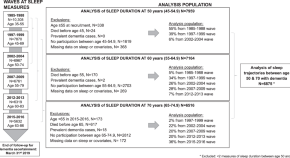
Association of sleep duration in middle and old age with incidence of dementia
Sleep dysregulation has been linked to dementia, but it is unknown whether sleep duration earlier in life is associated with dementia risk. Here, the authors show higher dementia risk associated with short sleep duration (six hours or less) in a longitudinal study of middle and older age adults.
- Séverine Sabia
- Aurore Fayosse
- Archana Singh-Manoux
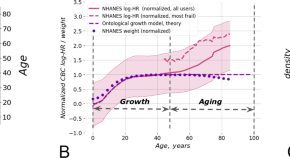
Longitudinal analysis of blood markers reveals progressive loss of resilience and predicts human lifespan limit
Aging is associated with an increased risk of chronic diseases and functional decline. Here, the authors investigate the fluctuations of physiological indices along aging trajectories and observed a characteristic decrease in the organism state recovery rate.
- Timothy V. Pyrkov
- Konstantin Avchaciov
- Peter O. Fedichev

Restoration of energy homeostasis by SIRT6 extends healthy lifespan
Aging is associated with increased frailty and disrupted energy homeostasis. Here, the authors show that SIRT6 overexpression extends the lifespan of male and female mice and demonstrate that SIRT6 optimizes energy homeostasis in old age, which delays frailty and preserves healthy aging.
- A. Roichman
- S. Elhanati
- H. Y. Cohen

Triptonide is a reversible non-hormonal male contraceptive agent in mice and non-human primates
No male contraceptive pills are currently available. Here, the authors use triptonide, a compound derived from a Chinese plant, to deform sperm so that they cannot move properly, thereby causing reversible infertility in male mice and monkeys.
- Zongliang Chang
- Weibing Qin

Fasting alters the gut microbiome reducing blood pressure and body weight in metabolic syndrome patients
Nutritional modification including fasting has been shown to reduce cardiometabolic risk linked to western diet. Here the authors show implementation of fasting resulted in alterations to the intestinal microbiota, and circulating immune cells, improving blood pressure and body weight in patients with metabolic syndrome.
- András Maifeld
- Hendrik Bartolomaeus
- Sofia K. Forslund

Transneuronal delivery of hyper-interleukin-6 enables functional recovery after severe spinal cord injury in mice
The CNS has limited ability to regenerate following injury, Here, the authors show that a single injection of AAV-hyper-interleukin-6 in the sensory motor cortex results in corticospinal and raphe spinal tracts regeneration in the injured spinal cord as well as functional recovery in mice.
- Marco Leibinger
- Charlotte Zeitler
- Dietmar Fischer

Spatially resolved transcriptomics reveals the architecture of the tumor-microenvironment interface
During tumor progression, cancer cells contact different neighboring cell types, but it is unclear how these interactions affect cancer cell behavior. Here, the authors use spatially resolved transcriptomics and single-cell RNA-seq to study the role of cilia at the tumormicroenvironment interface.
- Miranda V. Hunter
- Reuben Moncada
- Richard M. White

Adjuvant oncolytic virotherapy for personalized anti-cancer vaccination
Viruses expressing tumour antigens can prime and boost anti-tumour immunity but the efficiency of this approach depends on the capacity of the virus to infect the host. Here, the authors show that vaccination with oncolytic viruses co-administered with tumour antigenic peptides is as efficient as antigen-engineered oncolytic viruses.
- K. Geoffroy
- M.-C. Bourgeois-Daigneault
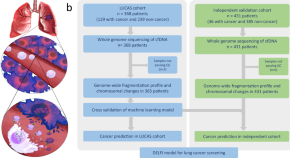
Detection and characterization of lung cancer using cell-free DNA fragmentomes
DNA from tumour cells can be detected in the blood of cancer patients. Here, the authors show that cell free DNA fragmentation patterns can identify lung cancer patients and when this information is further interrogated it can be used to predict lung cancer histological subtype.
- Dimitrios Mathios
- Jakob Sidenius Johansen
- Victor E. Velculescu
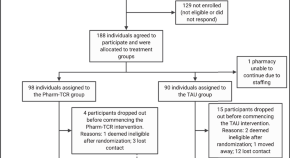
A randomized controlled trial of pharmacist-led therapeutic carbohydrate and energy restriction in type 2 diabetes
Community pharmacists are accessible healthcare providers with expertise in medication management. Here the authors show that a low-carbohydrate, low-energy diet implemented by community pharmacists reduced diabetes medication use and improved glucose control in people with type 2 diabetes.
- Cody Durrer
- Sean McKelvey
- Jonathan P. Little
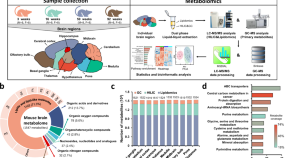
A metabolome atlas of the aging mouse brain
Metabolites play an important role in physiology, yet the complexity of the metabolome and its interaction with disease and aging is poorly understood. Here the authors present a comprehensive atlas of the mouse brain metabolome and how it changes during aging.
- Oliver Fiehn
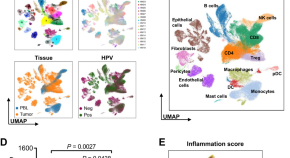
Investigating immune and non-immune cell interactions in head and neck tumors by single-cell RNA sequencing
The tumor microenvironment (TME) has an important role in Head and Neck Squamous Cell Carcinoma (HNSCC) progression. Here, using single-cell RNA sequencing and multiplexed imaging, the authors report the cellular complexity of the TME in patients with HNSCC, exploring inflammatory status, stromal heterogeneity and immune checkpoint receptor-ligand interactions.
- Cornelius H. L. Kürten
- Aditi Kulkarni
- Robert L. Ferris

Single-cell profiling of tumor heterogeneity and the microenvironment in advanced non-small cell lung cancer
Comprehensive profiles of tumour and microenvironment are critical to understand heterogeneity in non-small cell lung cancer (NSCLC). Here, the authors profile 42 late-stage NSCLC patients with single-cell RNA-seq, revealing immune landscapes that are associated with cancer subtype or heterogeneity.
- Fengying Wu
- Caicun Zhou

Biomimetic nanoparticles deliver mRNAs encoding costimulatory receptors and enhance T cell mediated cancer immunotherapy
Antibodies targeting OX40 or CD137, two T cell costimulatory receptors, have been shown to improve antitumor immunity. Here the authors design a phospholipid-derived nanoparticle to deliver OX40 or CD137 mRNA to T cells in vivo, improving efficacy of anti-OX40 and anti-CD137 antibody therapy in preclinical tumor models.
- Xinfu Zhang
- Yizhou Dong

Sexual dimorphism in glucose metabolism is shaped by androgen-driven gut microbiome
Male sex is a risk factor for impaired glucose metabolism and type 2 diabetes. Here the authors identify that androgen modulates the gut microbiome, which drives insulin resistance and contributes to sexual dimorphism in glucose metabolism in mice.
- Weiqing Wang

Blood n-3 fatty acid levels and total and cause-specific mortality from 17 prospective studies
Associations between of omega-3 fatty acids and mortality are not clear. Here the authors report that, based on a pooled analysis of 17 prospective cohort studies, higher blood omega-3 fatty acid levels correlate with lower risk of all-cause mortality.
- William S. Harris
- Nathan L. Tintle
- The Fatty Acids and Outcomes Research Consortium (FORCE)

Multi-omics analysis identifies therapeutic vulnerabilities in triple-negative breast cancer subtypes
Triple negative breast cancer can be divided into additional subtypes. Here, using omics analyses, the authors show that in the mesenchymal subtype expression of MHC-1 is repressed and that this can be restored by using drugs that target subunits of the epigenetic modifier PRC2.
- Brian D. Lehmann
- Antonio Colaprico
- X. Steven Chen
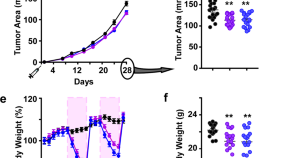
Daily caloric restriction limits tumor growth more effectively than caloric cycling regardless of dietary composition
Caloric restriction (CR) has been shown as an effective intervention to reduce tumorigenesis, but alternative less stringent dietary interventions have also been considered. Here, the authors show that in a murine model of breast cancer CR has a larger effect on preventing tumorigenesis and metastasis compared to periodic caloric cycling.
- Laura C. D. Pomatto-Watson
- Monica Bodogai
- Rafael de Cabo

Neoadjuvant immunotherapy with nivolumab and ipilimumab induces major pathological responses in patients with head and neck squamous cell carcinoma
Immune checkpoint blockade has become standard care for patients with recurrent metastatic head and neck squamous cell carcinoma (HNSCC). Here the authors present the results of a non-randomized phase Ib/IIa trial, reporting safety and efficacy of neoadjuvant nivolumab monotherapy and nivolumab plus ipilimumab prior to standard-of-care surgery in patients with HNSCC. .
- Joris L. Vos
- Joris B. W. Elbers
- Charlotte L. Zuur

9p21 loss confers a cold tumor immune microenvironment and primary resistance to immune checkpoint therapy
The molecular mechanisms of resistance to immune checkpoint therapy remain elusive. Here, the authors perform immunogenomic analysis of TCGA data and data from clinical trials for antiPD-1/PD-L1 therapy and highlight the association of 9p21 loss with a cold tumor microenvironment and resistance to therapy.
- Guangchun Han
- Guoliang Yang
- Linghua Wang

Gut bacteria identified in colorectal cancer patients promote tumourigenesis via butyrate secretion
Several bacteria in the gut microbiota have been associated with colorectal cancer (CRC) but it is not completely clear whether they have a role in tumourigenesis. Here, the authors show enrichment of 12 bacterial taxa in two cohorts of CRC patients and that two Porphyromonas species accelerate CRC onset through butyrate secretion.
- Shintaro Okumura
- Yusuke Konishi

Elevated circulating follistatin associates with an increased risk of type 2 diabetes
Follistatin promotes in type 2 diabetes (T2D) pathogenesis in model animals and is elevated in patients with T2D. Here the authors report that plasma follistatin associates with increased risk of incident T2D in two longitudinal cohorts, and show that follistatin regulates insulin-induced suppression lipolysis in cultured human adipocytes.
- Chuanyan Wu
- Yang De Marinis

Tau activates microglia via the PQBP1-cGAS-STING pathway to promote brain inflammation
Brain inflammation generally accelerates neurodegeneration but the mechanisms of this are not fully characterised. Here the authors show that PQBP1 in microglia is important for sensing extrinsic Tau 3 R/4 R proteins and triggers an innate immune response through cGAS and STING resulting in cognitive impairment.
- Hiroki Shiwaku
- Hitoshi Okazawa

Long-term treatment with senolytic drugs Dasatinib and Quercetin ameliorates age-dependent intervertebral disc degeneration in mice
Intervertebral disc degeneration is a leading cause of chronic back pain and disability. Here the authors show that long term treatment with senolytic compounds Dasatinib and Quercetin reduces disc senescence burden and ameliorates age-dependent degeneration in mice.
- Emanuel J. Novais
- Victoria A. Tran
- Makarand V. Risbud

DNA/RNA heteroduplex oligonucleotide technology for regulating lymphocytes in vivo
Using gene silencing to regulate lymphocyte function is a promising therapeutic approach for autommunity, inflammation and cancer. Here the authors use a heteroduplex oligonucleotide for improved potency, efficacy and longer retention times.
- Masaki Ohyagi
- Tetsuya Nagata
- Takanori Yokota
Quick links
- Explore articles by subject
- Guide to authors
- Editorial policies
Masks Strongly Recommended but Not Required in Maryland, Starting Immediately
Due to the downward trend in respiratory viruses in Maryland, masking is no longer required but remains strongly recommended in Johns Hopkins Medicine clinical locations in Maryland. Read more .
- Vaccines
- Masking Guidelines
- Visitor Guidelines
Research Topics
General research, cancer research, genetics research, genome biology.
- Research Paper Guides
- Research Paper Topics
- 300+ Medical Research Topics & Ideas for Students to Choose
- Speech Topics
- Basics of Essay Writing
- Essay Topics
- Other Essays
- Main Academic Essays
- Basics of Research Paper Writing
- Miscellaneous
- Chicago/ Turabian
- Data & Statistics
- Methodology
- Admission Writing Tips
- Admission Advice
- Other Guides
- Student Life
- Studying Tips
- Understanding Plagiarism
- Academic Writing Tips
- Basics of Dissertation & Thesis Writing
- Essay Guides
- Formatting Guides
- Basics of Research Process
- Admission Guides
- Dissertation & Thesis Guides
300+ Medical Research Topics & Ideas for Students to Choose

Table of contents
Use our free Readability checker
Every healthcare research begins with a single step. But in the world of academia, that step often involves hours of pondering over the perfect medical research topic idea. When it comes to medical research paper topics, there's a seemingly limitless array of options that stretches as far as the mind can wander. The potential of this field is exciting but can also be challenging to explore.
To help you narrow down your choices and research effectively, our research paper writer team compiled a list of interesting medical research topics. Whether you want to write about the latest developments in public health or explore the implications of emerging technologies, this blog won't disappoint you.
What Are Medical Research Paper Topics?
Medical research topics are the ideas or concepts related to health and medicine. They often explore new treatments, developments in diagnosis, prevention of illnesses, or even the effects of lifestyle choices. The scope of topics in medicine is vast and can include such aspects:
- Clinical medicine
- Biomedical research
- Public health
- Mental health research topics
- Medical technology
- Health services research.
Your choice should stem from your interests and existing gaps that need to be filled.
Characteristics of Good Medical Research Topics
Choosing the right medical topic for a research paper is like finding a golden ticket to a successful study. Here's what makes a medicine research idea a real showstopper:
- Engagement Research should be engaging and relevant to the audience.
- Precision Good ideas are always specific, so that you can focus your research on a particular area without being too vague.
- Authenticity A good topic needs to address an issue that hasn't been studied before.
- Feasibility Ensure your topic is realistic. Good research topics in healthcare should fit within your budget, timeframe, and available resources.
- Relevance Winning medical research project topics should address current and pressing issues in healthcare.
How to Choose a Medical Research Topic?
Selecting the best idea out of multiple medicine research topics can be a daunting task, especially when you have so many fields to explore. Here are a few steps that will help you settle on a theme:
- Brainstorm and come up with as many ideas as possible.
- Narrow down your list by considering factors such as your interest and resources.
- Look for current tendencies in healthcare research.
- Consult your supervisor or a librarian to verify the pertinence of the topic that you have chosen.
- Make sure your topic is specific enough to be addressed within the scope of your project.
Once you come up with a fitting medical research topic, consider half the battle won. But in case you have difficulties creating an original title, our online paper writers prepared a list of research ideas for medical students you might like.
List of Top Medical Research Topics
Below we collected various medical topics to research in your study. From groundbreaking technologies to emerging diseases, there are countless avenues to investigate. If you're on the hunt for a compelling topic, here are some of the top medical researches topics capturing attention in 2023:
- Effective strategies for medical talent acquisition and retention.
- The best methods for enhancing preventative care measures in contemporary medicine.
- The role and impact of telemedicine in reinventing healthcare management.
- Implications of artificial intelligence on diagnostics and treatment plans.
- The rising threat of antimicrobial resistance and its effects on global health.
- The link between environmental changes and public health outcomes.
- Complexities of vaccine development and human immune responses.
- Health inequities: Causes, consequences, and potential solutions.
- New treatment approaches for neurodegenerative disorders.
- A multidisciplinary approach to tackling obesity and metabolic disorders.
Good Medical Research Topics
Navigating countless medical topics for research papers can often feel like a journey through a labyrinth. Here are some intriguing ideas that could ignite your curiosity and fuel your research:
- How does climate change impact human health?
- Communication disorders: A closer look at deafness.
- The hidden dangers of household air pollution.
- The escalating threat of diabetes in the public sphere.
- Coronavirus and how it changed the landscape of public health.
- Assessing oral health: Beyond the basics.
- Tobacco and alcohol control: A public health perspective.
- Health implications of a sedentary lifestyle.
- Urban pollution and its impact on respiratory diseases
- The role of healthy diets in disease prevention.
- Exploring the mental health impact of social media.
- How do cultural factors influence public health initiatives?
- The role of nutrition in managing chronic diseases.
- Investigating the genetics of neurodegenerative disorders.
- What are some ethical considerations in gene editing?
Interesting Medical Research Topics
Exploring the depths of medicine can be an exciting experience. You'll discover that every issue has a plethora of complexities and avenues to investigate. Here are some interesting medical topics for research paper that could pique your curiosity:
- The influence of lifestyle changes on cardiovascular health.
- What are some psychological impacts of chronic illness?
- Connection between gut health and mental well-being.
- Evaluating the effectiveness of telehealth during the pandemic.
- How do genetic factors influence addiction susceptibility?
- Autoimmune diseases and their peculiarities.
- How does stress affect immune function?
- What are some health impacts of sleep disorders?
- The link between socioeconomic status and health outcomes.
- Exploring innovations in pain management.
- Analyzing implications of artificial intelligence in healthcare.
- Effect of climate change on infectious disease patterns.
- A look into advancements in cancer immunotherapy.
- Exploring the potential of stem cells in treating degenerative diseases.
- How does diet influence the progression of Alzheimer's disease?
Easy Medical Research Topics
You may be looking for simple research topics in medicine that won't take too much time and effort to complete. Explore these straightforward ideas that could make your paper stand out:
- Importance of proper sanitation in healthcare settings.
- Exploring the role of patient support groups in disease management.
- Analyzing the efficacy of physical therapy interventions.
- What are the cost-effective interventions for healthcare delivery?
- What are some effects of new pharmaceuticals?
- What are some health consequences of air pollution?
- How does meditation improve outcomes in mental health care?
- Evaluating the role of nutritionists in weight loss management.
- An analysis of trends and patterns in emerging diseases.
- Exploring alternative medicines in contemporary healthcare.
- Examining the impact of healthcare policies on public health outcomes.
- Can the use of herbs provide an effective remedy for certain illnesses?
- How does mental health stigma affect access to treatment?
- Drug abuse: Causes, consequences and prevention strategies.
- What are some psychological issues associated with chronic illnesses?
Best Medical Research Topics
When it comes to choosing medical research topics, you need something that's striking and meaningful. Hover over these ideas to spot the fitting idea for your medical research:
- Exploring new strategies for treating neurological disorders.
- What is the role of medical ethics in modern healthcare?
- What are some implications of genetics in personalized healthcare?
- Exploring innovations in non-invasive diagnosis techniques.
- Effect of temperature on patient outcomes in critical care.
- How does air pollution influence healthcare costs?
- How do changes in lifestyle lead to better health outcomes?
- Implications of electronic health records for patient privacy.
- Role of nutritionists in disease prevention.
- How technology is being used to revolutionize healthcare?
- What are the most effective treatments for rare diseases?
- How have medical imaging techniques advanced over the years?
- Investigating potential treatments for autism spectrum disorder.
- Exploring innovative approaches to mental healthcare delivery.
- What are some implications of artificial intelligence in medical diagnosis?
Controversial Medical Topics for a Research Paper
Navigate through the most contentious research topics in health and explore the debate that surrounds them. Consider these thought-provoking ideas and medical controversial topics:
- Ethical implications of genetic engineering.
- Euthanasia and physician-assisted suicide - where do we draw the line?
- Are mandatory vaccinations an infringement on personal freedom or a public health necessity?
- Evaluating medical and legal perspectives on the use of medical marijuana.
- Ethical concerns around animal testing in medical research.
- How do we navigate the morality and legality of abortion?
- Should the criminal justice system focus more on mental health treatment than punishment?
- Is stem cell research a moral dilemma or a medical breakthrough?
- Ethical considerations in organ trading and transplantation.
- Who should shoulder the burden of healthcare costs?
- Is access to healthcare a privilege or a human right?
- Ethics of using placebo in clinical trials – is it justified?
- Assessing the role of Big Pharma in healthcare - is it a necessary evil?
- Can genetic screening lead to discrimination, despite its benefits?
- Should modern medicine take precedence over traditional medicine, or is there room for both?
New Medical Research Topics
Discover the latest studies in healthcare and explore the newest topics for a medical research paper. Below we prepared some cutting-edge topics for you to consider:
- Can gene-editing technologies such as CRISPR transform the treatment of genetic disorders?
- How does microbiome therapy potentially influence the treatment of autoimmune diseases?
- Exploring the advent of personalized medicine through genomics and precision diagnostics.
- How is virtual reality altering the landscape of surgical training and rehabilitation therapies?
- How can telehealth improve healthcare access, particularly in remote and underserved areas?
- The role of nanotechnology in developing more efficient drug delivery systems.
- What are some implications of the rising antimicrobial resistance, and where does the future of antibiotics lie?
- How are advances in non-invasive treatments changing the face of chronic disease management?
- Is precision oncology the future of cancer treatment?
- What are some implications and potential of regenerative medicine and tissue engineering?
- Can advancements in wearable technology revolutionize personal health monitoring?
- How are gut microbiota affecting our understanding and treatment of metabolic disorders?
- What role do nanobots play in medical treatments?
- Can big data analytics be used to improve the accuracy of medical diagnosis?
Medical Research Topics Ideas for Students
There are multiple medical topics to write about. But as a student, you're probably looking for something more specific. For your convenience, we divided the titles by academic levels. So, roll up your sleeves and get ready to explore these health topics for research that your professor will surely appreciate.
Medical Research Topics for High School
For students who want to investigate different aspect of healthcare, we provided these examples of ideas. Browse through these medical research topics for high school students to spot the most relevant theme:
- How does the human immune system work?
- Vaccinations as an essential tool in preventing diseases.
- A basic overview of genetic disorders.
- What makes viruses unique?
- How does the body fight off bacterial infections?
- The impact of lifestyle factors on heart health.
- Diabetes: Types, causes, and prevention strategies.
- The importance of mental health in the medical field.
- Skin health: Understanding common skin conditions like acne and eczema.
- Structure and function of the human heart.
- Role of antibiotics and how do they fight bacteria?
- Journey of a pill: From ingestion to action.
- What happens in an allergic reaction?
- How does physical exercise impact the body and mind?
- Racial disparities in healthcare and access to treatment.
Medical Research Topics for College Students
At the college level, you may be asked to write a research paper on a complex issue. We prepared these health research topics for college students to help you get started on your assignment:
- Exploring the implications of health insurance reform.
- Genomic sequencing in the early detection of genetic disorders.
- Machine learning in diagnostic imaging: A new era in radiology?
- The role of diet in the prevention and management of type 2 diabetes.
- Exploring the link between circadian rhythms and health disorders.
- The role of personalized medicine in cancer treatment.
- Development and use of prosthetics in physical rehabilitation.
- Understanding autoimmune diseases: The body fighting itself.
- Addressing health disparities through community-based interventions.
- Inflammation in the development of chronic diseases.
- The rise of antibiotic-resistant bacteria: Causes and implications.
- Innovations in drug delivery systems: From nanoparticles to smart pills.
- How can we address the opioid crisis in America?
- Investigating the use of mobile technology for delivering healthcare services.
- Exploring medical implications of 3D printing technology.
Medical Research Topics by Subjects
We've also provided some research topics for medical students grouped by specific subjects. Check them out and pick the one you find most captivating.
Medical Research Topics in Pediatrics
Pediatrics involves the care and health of children. As such, it is a broad field ripe with interesting medical topics. Given the unique physiology needs of these younger populations, pediatric research is crucial for understanding illnesses. Below you can find captivating research topics in pediatrics:
- Exploring the impact of nutrition on childhood development.
- Assessing the effects of screen time on adolescent mental health.
- Investigating genetic factors in pediatric cancers.
- The role of vaccinations in preventing common childhood illnesses.
- Strategies for managing childhood obesity.
- The impact of prenatal exposure to drugs and alcohol on infant health.
- Development and evaluation of therapies for Autism Spectrum Disorders.
- Understanding the rise of food allergies in children.
- Advances in the treatment of congenital heart defects.
- Exploring the causes and treatment strategies for pediatric asthma.
- The impact of environmental toxins on child health.
- Evaluation of therapeutic approaches for Attention Deficit Hyperactivity Disorder (ADHD).
- Implications of early life stress on mental health in adolescence.
- The role of gut microbiota in pediatric diseases.
- Understanding the genetic basis of rare childhood disorders.
Medical Research Topics on Anatomy
Anatomy is the study of the organization and structure of the body. It encompasses many topics for medical research papers, from bones and organs to cell structures. Consider these ideas when writing your next anatomy paper:
- The role of genetics in bone fragility disorders.
- A comparative study of the skeletal systems across different species.
- The role and function of the lymphatic system in human health.
- Investigating complexities of the human brain's structure.
- Development and growth of human muscles.
- Impact of aging on bone health and structure.
- Exploring the intricate workings of the human cardiovascular system.
- Understanding structural changes in lungs in chronic respiratory diseases.
- The anatomical basis of speech and language development.
- Neuroanatomy of pain: Understanding pain pathways and mechanisms.
- Structural adaptations of the human body for athletic performance.
- Anatomy of the human eye and its role in vision.
- How does connective tissue support body structures?
- How does endocrine system impact hormone production?
- How does female anatomy change during pregnancy?
Medical Anthropology Research Topics
Medical anthropology looks at health and illness from a cultural perspective. It draws on expertise from across disciplines such as biology, psychology, and sociology to better understand how medical systems can work within different communities. If you’re interested in this field, use these ideas for med research topics:
- Investigating cultural beliefs and practices surrounding childbirth.
- Impact of socioeconomic status on health outcomes in different cultures.
- Understanding the role of traditional medicine in modern healthcare systems.
- An exploration of how cultural beliefs influence mental health perceptions.
- Effect of migration on health outcomes.
- The role of diet and nutrition in health from a cultural perspective.
- Cultural competence in healthcare delivery: Challenges and opportunities.
- Intersection of gender, culture, and health.
- Impact of societal norms and values on disease prevalence.
- Health disparities among indigenous populations.
- Role of social support networks in health and wellness across cultures.
- The impact of stigma on health outcomes in HIV/AIDS patients.
- The role of cultural anthropology in global health interventions.
- Ethnobotany and its implications for drug discovery.
- Understanding health practices in post-conflict societies.
Medicine Research Topics on Physiology
Physiology studies how living organisms function. This branch covers a range of medicine topics and ideas you might like. Here are some suggestions for your next med paper in physiology:
- How does nervous system contribute to the perception of pain?
- What physiological changes are triggered by acute and chronic stress?
- How does regular exercise influence cardiovascular health and overall well-being?
- How do hormones influence our metabolic rate and energy utilization?
- A detailed study on physiological transformations during pregnancy and lactation.
- How does the process of aging affect the function and resilience of various organs?
- Exploring the role of homeostasis in maintaining the body's internal balance.
- What are the key physiological processes involved in the sleep cycle?
- Unraveling complexities of the human digestive system from ingestion to excretion.
- How does the renal system contribute to maintaining blood pressure?
- Physiological adaptations humans undergo when living at high altitudes.
- How does dehydration disrupt normal bodily functions?
- Implications of obesity on respiratory function and efficiency.
- How does the endocrine system orchestrate growth and development?
- Investigating the neurophysiological underpinnings of memory formation and retrieval.

Medical Research Topics on Dermatology
From understanding skin conditions to exploring new procedures, dermatological research is a crucial part of improving skin health. Look through these medical research ideas centered around dermatology:
- Investigating the causes and treatments of acne in adolescents.
- Diet and the development of psoriasis.
- Understanding genetic factors involved in atopic dermatitis.
- Skin cancer: Risk factors, prevention, and treatment strategies.
- How do environmental factors cause skin aging?
- Exploring new treatments for hair loss.
- Understanding the correlation between stress and skin conditions.
- The role of the microbiome in skin health and disease.
- New approaches in the treatment of vitiligo.
- The impact of UV radiation on skin health.
- Exploring the pathophysiology of rosacea.
- The role of telemedicine in dermatology.
- Clinical advancements in the treatment of fungal skin infections.
- The correlation between skin health and mental health.
- Advances in cosmetic dermatology: Safety and effectiveness of new procedures.
Medical Research Paper Topics on Nursing
Nursing is a versatile profession that covers many areas of health care. It’s also an ever-changing field, with new research and advancements being released all the time. Here are some topics for medical research paper focusing on nursing:
- The impact of nurse-patient communication on patient outcomes.
- Exploring the effects of nurse fatigue on job performance.
- How does nurse practitioner autonomy influence patient care?
- Importance of bedside manner in nursing.
- The role of technology in nursing practice.
- Understanding challenges associated with ethical decision-making in nursing.
- How does nurse burnout affect patient safety?
- Analyzing factors contributing to nurse retention and turnover rates.
- The effects of staffing ratios on nurse and patient satisfaction.
- Exploring the role of leadership in nursing practice.
- What are implications of nurse workload on healthcare outcomes?
- The impact of health policy on nursing education and practice.
- Ethical dilemmas faced by nurses in end-of-life care.
- How does culture affect perceptions of healthcare and nursing.
- What are some effects of managed care on nurse autonomy?
>> Read more: Nursing Research Paper Topics
Medical Research Topics on Primary Care
Primary care is the first point of contact between patients and medical professionals. This branch is often overlooked, but it’s an important area of research that can improve health outcomes in communities around the world. Check out these interesting health topics to discuss in primary care:
- Exploring the impact of primary care physician shortages on health outcomes.
- How do socio-economic factors influence health outcomes in primary care?
- Strategies to improve patient adherence to treatment.
- What are some challenges and opportunities of providing mental health services?
- The role of primary care in managing chronic diseases.
- Evaluating the effectiveness of preventive measures in primary care.
- How does patient education influence health outcomes in primary care?
- The role of health technology in improving primary care delivery.
- What are some best practices for managing multimorbidity in primary care?
- Developing effective communication strategies for diverse patient populations in primary care.
- The impact of health policy changes on care delivery.
- How can primary care practices be adapted to meet the needs of an aging population?
- Assessing the effectiveness of integrated care models.
- The role of primary care in addressing health disparities.
- Strategies for improving patient satisfaction in primary care.
Medical Research Topics on Public Health
Public health is an important area of research - understanding how to improve health in communities and prevent illness and injury are crucial skills for medical professionals. Here are some medical related research topics that could kick-start your next project:
- What are the causes, implications and solutions to food insecurity?
- The role of public health in the management of infectious diseases.
- Assessing the effectiveness of smoking cessation programs.
- The role of public health initiatives in combating the obesity epidemic.
- What are some policy interventions that can improve public health?
- The impact of racism and discrimination on public health outcomes.
- Exploring new models for delivering mental health services in underserved communities.
- The impact of urbanization on public health outcomes.
- Evaluating the effectiveness of school-based health education programs.
- Strategies for managing public health crises during natural disasters.
- The implications of antibiotic resistance for public health.
- How can community engagement improve public health initiatives?
- The role of public health in the prevention and control of zoonotic diseases.
- What are the effects of environmental toxins on human health?
- How can mutual efforts reduce maternal and infant mortality rates?
>> View more: Public Health Research Topics
Medical Research Topics on Mental Health
Mental health is an important area of research, as it affects so many people around the world. Here are some medical research paper ideas to get you started on your next mental health project:
- The effectiveness of cognitive-behavioral therapy in treating anxiety disorders.
- How does social media influence adolescents' mental health?
- Exploring the link between gut health and wellbeing.
- The role of mindfulness in managing stress and enhancing mental well-being.
- Understanding the genetic factors in schizophrenia.
- How can stigma associated with mental illness be reduced in society?
- How do traumatic events influence mental health?
- Potential art therapy application in emotional health treatment.
- The role of mental health in managing chronic diseases.
- The impact of the COVID-19 pandemic on global mental health.
- Understanding the correlation between sleep deprivation and emotional wellbeing.
- Strategies for improving mental health services in rural areas.
- How can nutrition benefit mental health?
- Exploring the effectiveness of peer support in mental health recovery.
- The benefits and challenges of telepsychiatry.
>> View more: Mental Health Research Paper Topics
Medical Ethics Research Topics
Medical ethics is an important direction in healthcare research. Check these fascinating health topics to research for your next paper:
- Exploring moral implications of assisted suicide.
- How do ethical considerations come into play during organ transplantation?
- The ethical conundrum of maintaining patient confidentiality in the digital age.
- The integral role of informed consent in the physician-patient relationship.
- What ethical dilemmas arise from genetic testing and gene editing technologies?
- Ethical considerations of implementing artificial intelligence in healthcare.
- Is it ethical to use placebos in clinical trials?
- Balancing individual rights and public health in the context of a pandemic.
- Navigating ethical issues surrounding end-of-life care.
- Ethical challenges involved in the rationing of limited healthcare resources.
- What ethical considerations are necessary when conducting clinical research in low-resource settings?
- Ethical debate surrounding the use of animals for medical research.
- Ethical questions raised by advancements in reproductive technologies and rights.
- What are ethical implications of mandatory vaccination policies?
- Understanding ethical dilemmas associated with using health data for research.
Extra Medical Research Papers Topics
Medical research is an important topic for many people. Below you can find more medical research topic ideas that didn't fall in any of categories offered above.
Health Research Topics
Health research paper topics are crucial to understanding the effects of trends and developments in the medical field. Here are some ideas to get you inspired:
- How does virtual reality change physical rehabilitation?
- Investigating the effects of pollution on respiratory health.
- The effectiveness of mindfulness-based interventions in mental health.
- The role of nutrition in managing cardiovascular diseases.
- Assessing health impacts of climate change.
- Evaluating the effectiveness of health education programs in schools.
- Strategies for promoting mental health in the workplace.
- Investigating the links between diet and cognitive function.
- How does health literacy influence individual health outcomes?
- Implications of stress on immune function.
- Effectiveness of public health campaigns on smoking cessation.
- Exploring the effectiveness of herbal remedies in treating diseases.
- The role of sports in promoting a healthy lifestyle.
- Strategies to reduce the prevalence of substance abuse.
- Pros and cons of electronic record systems in healthcare.
Clinical Research Topics
Clinical ideas are essential for approaching healthcare from a scientific point of view. Find some medical research paper topics to cover in your project:
- Exploring the effectiveness of novel treatments in rare diseases.
- The role of biomarkers in disease diagnosis and treatment.
- How do medical interventions influence patient satisfaction?
- Exploring links between nutrition and cancer prevention.
- How do lifestyle modifications influence diabetes management?
- Understanding the implications of drug interactions.
- How does genetic testing influence medical decision-making?
- What are some challenges associated with disseminating medical evidence?
- Predicting disease progression through machine learning.
- Assessing the accuracy of various diagnostic tools.
- Implications of medical robotics and automation in healthcare.
- Evaluating the impact of patient-centered care on quality outcomes.
- Clinical trials: Challenges and opportunities.
- How can vulnerable populations access medical care?
- How can public-private partnerships benefit healthcare delivery?
Bottom Line on Medical Topics to Research
Choosing healthcare research paper topics can be quite overwhelming. We hope our suggestions will help you in developing an engaging medical research topic for your upcoming project or assignment. Remember to always check with your instructor before starting any project, so that you are aware of all specific requirements.
Why not pay for research paper crafted by professionals? With our team of skilled writers, you will get a quality, plagiarism-free research paper delivered on time. Invest in your academic success today!

Joe Eckel is an expert on Dissertations writing. He makes sure that each student gets precious insights on composing A-grade academic writing.
You may also like

151+ Public Health Research Topics [Updated 2024]

The important area of public health research is essential to forming laws, influencing medical procedures, and eventually enhancing community well-being. As we delve into the vast landscape of public health research topics, it’s essential to understand the profound impact they have on society.
This blog aims to provide a comprehensive guide to selecting and understanding the diverse array of public health research topics.
Overview of Public Health Research Topics
Table of Contents
Public health research encompasses a wide range of subjects, reflecting the interdisciplinary nature of the field. From epidemiology and health policy to environmental health and infectious diseases, researchers navigate through various dimensions to address complex health challenges.
Each category holds its own significance, contributing to the overall understanding of public health dynamics.
Key Considerations in Selecting Public Health Research Topics
- Current Relevance: Assess the timeliness of potential topics by considering recent health trends, emerging issues, and societal concerns.
- Impact on Public Health: Evaluate the potential impact of the research on improving health outcomes, addressing disparities, or influencing policy and interventions.
- Feasibility and Resources: Gauge the practicality of conducting research on a particular topic, considering available resources, data accessibility, and research infrastructure.
- Ethical Considerations: Scrutinize the ethical implications of the research, ensuring it aligns with ethical standards and guidelines, especially when dealing with vulnerable populations or sensitive topics.
Top 151+ Public Health Research Topics
Epidemiology.
- The Impact of Social Determinants on Disease Outcomes
- Patterns and Trends in Emerging Infectious Diseases
- Investigating Health Disparities among Different Ethnic Groups
- Childhood Obesity and its Long-Term Health Consequences
- Assessing the Effectiveness of Contact Tracing in Disease Control
Health Policy
- Universal Healthcare: Comparative Analysis of Global Models
- The Role of Telemedicine in Improving Healthcare Access
- Evaluating Mental Health Policies and Their Impact on Communities
- Assessing the Impact of Affordable Care Act on Public Health
- Vaccine Policies and Public Perception: A Comprehensive Study
Environmental Health
- Climate Change and Health: Adapting to the Challenges
- Air Quality and Respiratory Health in Urban Environments
- Waterborne Diseases and Strategies for Safe Water Supply
- Occupational Health Hazards: A Comprehensive Workplace Analysis
- The Impact of Green Spaces on Mental Health in Urban Areas
Infectious Diseases
- Antimicrobial Resistance: Strategies for Mitigation
- Vaccination Strategies and Herd Immunity
- Global Health Security: Preparedness for Pandemics
- The Impact of Vector-Borne Diseases on Public Health
- Emerging Trends in Antibiotic-Resistant Infections
Chronic Diseases
- Lifestyle Interventions for Preventing Cardiovascular Diseases
- Genetic Factors in the Development of Cancer: A Comprehensive Study
- Aging and Health: Addressing the Healthcare Needs of the Elderly
- Diabetes Prevention Programs: Efficacy and Implementation
- Mental Health in Chronic Disease Patients: Bridging the Gap
Maternal and Child Health
- Maternal Mortality: Understanding Causes and Prevention
- The Impact of Breastfeeding on Infant Health and Development
- Childhood Immunization: Barriers and Strategies for Improvement
- Teenage Pregnancy and Its Long-Term Health Consequences
- Mental Health Support for Postpartum Women: Current Gaps and Solutions
Health Behavior and Promotion
- Smoking Cessation Programs: Effectiveness and Challenges
- Physical Activity Promotion in Schools: Strategies for Success
- Nutrition Education and Its Impact on Healthy Eating Habits
- Mental Health Awareness Campaigns: Assessing Public Perceptions
- The Role of Social Media in Health Promotion
Global Health
- Assessing the Impact of International Aid on Global Health
- Water, Sanitation, and Hygiene (WASH) Programs in Developing Countries
- The Role of Non-Governmental Organizations in Global Health
- Communicable Disease Control in Refugee Populations
- Global Access to Essential Medicines: Challenges and Solutions
Community Health
- Community-Based Participatory Research: Best Practices and Challenges
- The Impact of Community Health Workers on Health Outcomes
- Health Literacy and its Relationship to Health Disparities
- Assessing the Effectiveness of Mobile Health (mHealth) Interventions
- Community Resilience in the Face of Public Health Crises
Healthcare Quality and Patient Safety
- Hospital-Acquired Infections: Strategies for Prevention
- Patient Safety Culture in Healthcare Organizations
- Quality Improvement Initiatives in Primary Care Settings
- Healthcare Accreditation: Impact on Patient Outcomes
- Implementing Electronic Health Records: Challenges and Benefits
Mental Health
- Stigma Reduction Programs for Mental Health Disorders
- Integrating Mental Health into Primary Care Settings
- The Impact of COVID-19 on Mental Health: Long-Term Implications
- Mental Health in the Workplace: Strategies for Employee Well-being
- Suicide Prevention Programs: Effectiveness and Outreach
Health Disparities
- Racial Disparities in Healthcare: Addressing Systemic Inequities
- LGBTQ+ Health Disparities and Inclusive Healthcare Practices
- Socioeconomic Status and Access to Healthcare Services
- Geographical Disparities in Health: Rural vs. Urban
- The Impact of Gender on Health Outcomes and Access to Care
Public Health Education
- Evaluation of Public Health Education Programs
- Innovative Approaches to Teaching Public Health Concepts
- Online Health Education Platforms: Opportunities and Challenges
- Interdisciplinary Training in Public Health: Bridging Gaps
- Continuing Education for Public Health Professionals: Current Landscape
Digital Health
- The Role of Wearable Devices in Health Monitoring
- Telehealth Adoption: Barriers and Opportunities
- Health Apps for Chronic Disease Management: User Perspectives
- Blockchain Technology in Healthcare: Privacy and Security Implications
- Artificial Intelligence in Disease Diagnosis and Prediction
Health Economics
- Cost-Effectiveness of Preventive Health Interventions
- The Impact of Healthcare Financing Models on Access to Care
- Pharmaceutical Pricing and Access to Essential Medicines
- Economic Evaluation of Health Promotion Programs
- Health Insurance Coverage and Health Outcomes: A Global Perspective
Innovations in Public Health
- 3D Printing in Healthcare: Applications and Future Prospects
- Gene Editing Technologies and their Ethical Implications
- Smart Cities and Public Health: Integrating Technology for Well-being
- Nanotechnology in Medicine: Potential for Disease Treatment
- The Role of Drones in Public Health: Surveillance and Intervention
Food Safety and Nutrition
- Foodborne Illness Outbreaks: Investigating Causes and Prevention
- Sustainable Food Systems: Implications for Public Health
- Nutritional Interventions for Malnutrition in Developing Countries
- Food Labeling and Consumer Understanding: A Critical Review
- The Impact of Fast Food Consumption on Public Health
Substance Abuse
- Opioid Epidemic: Strategies for Prevention and Treatment
- Harm Reduction Approaches in Substance Abuse Programs
- Alcohol Consumption Patterns and Public Health Outcomes
- Smoking and Mental Health: Exploring the Connection
- Novel Psychoactive Substances: Emerging Threats and Strategies
Occupational Health
- Workplace Stress and Mental Health: Intervention Strategies
- Occupational Hazards in Healthcare Professions: A Comparative Analysis
- Ergonomics in the Workplace: Improving Worker Health and Productivity
- Night Shift Work and Health Consequences: Addressing Challenges
- Occupational Health and Safety Regulations: A Global Overview
Disaster Preparedness and Response
- Pandemic Preparedness and Lessons from COVID-19
- Natural Disasters and Mental Health: Post-Traumatic Stress
- Emergency Response Systems: Improving Timeliness and Efficiency
- Communicating Health Risks During Emergencies: Public Perception
- Collaborative Approaches to Disaster Response in Global Health
Cancer Research
- Precision Medicine in Cancer Treatment: Current Advancements
- Cancer Screening Programs: Efficacy and Challenges
- Environmental Factors and Cancer Risk: Exploring Connections
- Survivorship Care Plans: Enhancing Quality of Life after Cancer
- Integrative Therapies in Cancer Care: Complementary Approaches
Sexual and Reproductive Health
- Access to Contraception in Developing Countries: Challenges and Solutions
- Comprehensive Sex Education Programs: Impact on Teen Pregnancy
- Reproductive Health Rights: Global Perspectives and Challenges
- Infertility Treatment: Ethical Considerations and Societal Impact
- Maternal and Child Health in Conflict Zones: Addressing Challenges
Cardiovascular Health
- Hypertension Prevention Programs: Strategies and Effectiveness
- Cardiovascular Disease in Women: Gender-Specific Risk Factors
- Innovations in Cardiac Rehabilitation Programs
- Artificial Heart Technology: Advancements and Ethical Implications
- Impact of Air Pollution on Cardiovascular Health: A Global Concern
Social Determinants of Health
- Educational Attainment and Health Outcomes: Exploring Links
- Income Inequality and its Impact on Population Health
- Social Support Networks and Mental Health: A Comprehensive Study
- Neighborhood Environments and Health Disparities
- Employment and Health: The Interplay of Work and Well-being
Genomics and Public Health
- Population Genomics and its Implications for Public Health
- Genetic Counseling and Education: Empowering Individuals and Families
- Ethical Issues in Genetic Research: Privacy and Informed Consent
- Pharmacogenomics: Tailoring Drug Therapies to Individual Genotypes
- Gene-Environment Interactions in Disease Risk: Unraveling Complexities
Public Health Ethics
- Informed Consent in Public Health Research: Current Practices
- Ethical Challenges in Global Health Research: Balancing Priorities
- Confidentiality in Public Health Reporting: Striking the Right Balance
- Research with Vulnerable Populations: Ethical Considerations
- Ethical Implications of Emerging Technologies in Healthcare
Health Communication
- The Role of Media in Shaping Public Health Perceptions
- Health Literacy Interventions: Improving Understanding of Health Information
- Social Media Campaigns for Public Health Promotion: Best Practices
- Tailoring Health Messages for Diverse Audiences: Cultural Competency
- Risk Communication in Public Health Emergencies: Lessons Learned
Nutrigenomics
- Personalized Nutrition Plans based on Genetic Makeup
- Impact of Nutrigenomics on Chronic Disease Prevention
- Ethical Considerations in Nutrigenomics Research
- Public Perceptions of Nutrigenomic Testing: A Qualitative Study
- Integrating Nutrigenomics into Public Health Policies
Public Health and Artificial Intelligence
- Predictive Analytics in Disease Surveillance: Harnessing AI for Early Detection
- Ethical Considerations in AI-Driven Health Decision Support Systems
- Machine Learning in Epidemiology: Predicting Disease Outbreaks
- Natural Language Processing in Public Health: Text Mining for Insights
- Bias in AI Algorithms: Implications for Health Equity
Health Disparities in Aging
- Geriatric Health Disparities: Bridging the Gap in Elderly Care
- Ageism in Healthcare: Addressing Stereotypes and Discrimination
- Social Isolation and Health Consequences in Aging Populations
- Access to Palliative Care for Older Adults: A Global Perspective
- Alzheimer’s Disease and Ethnic Disparities in Diagnosis and Treatment
- Loneliness and Mental Health in the Elderly: Interventions and Support
Research Methodologies in Public Health
Public health research employs various methodologies, including quantitative, qualitative, and mixed-methods approaches. Each method brings its own strengths to the research process, allowing researchers to gain a comprehensive understanding of the complex issues they investigate.
Community-based participatory research is another valuable approach, emphasizing collaboration with communities to address their specific health concerns.
Challenges and Opportunities in Public Health Research
While public health research is immensely rewarding, it comes with its own set of challenges. Funding constraints, ethical dilemmas, the need for interdisciplinary collaboration, and the integration of technology pose both obstacles and opportunities.
Researchers must navigate these challenges to ensure their work has a meaningful impact on public health.
In conclusion, public health research topics are diverse and dynamic, reflecting the complex nature of the field. As researchers embark on their journeys, they must carefully consider the relevance, impact, and ethical implications of their chosen topics.
The collaborative and interdisciplinary nature of public health research positions it as a powerful tool in addressing the health challenges of our time. By exploring the depths of these topics, researchers contribute to the collective effort to build healthier and more equitable communities.
As we move forward, a continued exploration of relevant public health research topics is essential for shaping the future of healthcare and improving the well-being of populations worldwide.
Related Posts

Step by Step Guide on The Best Way to Finance Car

The Best Way on How to Get Fund For Business to Grow it Efficiently
- U.S. Department of Health & Human Services

- Virtual Tour
- Staff Directory
- En Español

Join Us for Healthy Vision Month 2024!
NEI is shining a light on vision loss and mental health — and sharing steps people with a visual impairment can take to thrive in their daily lives.
Learn more »

RECOVER Initiative launches clinical trials evaluating treatments for exercise intolerance, post-exertional malaise, and sleep disturbances.

May is National Speech-Language-Hearing Month
Learn about developmental language disorder—a disorder affecting 1 in 14 kindergarteners.

Celebrating at graduation this year?
Talk with your high school grads about celebrating safely.

STEM Teaching Resources
Innovative NIH-funded content to engage K-12 students in health science.
In the News

High-Risk Prostate Cancer
New urine test can identify aggressive cancers that need treatment

Parents Lost to Overdose
From 2011-21, more than 321,000 children lost a parent to a drug overdose.

Alzheimer’s Disease
People with two copies the APOE4 gene are at much higher risk.

Fentanyl Pill Seizures
Law enforcement sees massive jump in confiscated amount of the drug.
NIH at a Glance
Virtual-tour-screenshot-square.jpg.
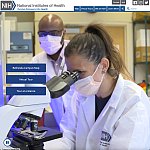
Take the Virtual Tour
Explore the Bethesda campus and how NIH turns discovery into health.
monica-bertagnolli-thumbnail.jpg

The NIH Director
Monica M. Bertagnolli, M.D., is the NIH Director and provides leadership for the 27 Institutes and Centers that make up NIH.
nih-at-a-glance-funding.jpg

Funding for Research
NIH is the largest source of funding for medical research in the world, creating hundreds of thousands of high-quality jobs.
nih-at-a-glance-labs.jpg

Labs at NIH
Scientists conduct research on NIH campuses across the U.S., as part of our Intramural Research Program.
improving-health-collage.jpg

Impact of NIH Research
NIH-supported research has had a major positive impact on nearly all of our lives.
researcher-holding-petri-dish.jpg

Jobs at NIH
The central recruitment point of access to all NIH jobs and training opportunities
A public-private partnership to develop a coordinated research strategy to speed the most promising COVID-19 vaccines and treatments.
Rapid Acceleration of Diagnostics (RADx)
An initiative to speed innovation in the development, commercialization, and implementation of technologies for COVID-19 testing.
A new research initiative to understand, prevent, and treat the long-term effects of COVID-19.
COVID-19 Treatment Guidelines
Guidelines from NIH for the diagnosis, treatment, and control of COVID-19.
Research information from NIH
NIH supports research in COVID-19 testing, treatments, and vaccines. También disponible en español.
NIH COVID-19 Safety Plan
Guidance to NIH staff, including employees, contractors, trainees, and volunteers, related to COVID-19.
Featured Resources & Initiatives
A new science agency proposed by President Joseph Biden as part of NIH to drive biomedical breakthroughs and provide transformative solutions for all patients.
Anti-Sexual Harassment
NIH does not tolerate pervasive or severe harassment of any kind, including sexual harassment.
Ending Structural Racism
Learn more about NIH’s efforts to end structural racism in biomedical research through the UNITE initiative.
All of Us Research Program
A research effort to revolutionize how we improve health and treat disease.
NIH HEAL Initiative
Trans-agency effort to speed scientific solutions to stem the national opioid crisis.
Clinical Trials
Learn about participating in clinical trials and where to find them.
Accelerating Medicines Partnership
A bold venture to help identify new treatments and cures for diseases.
Medical Research Initiatives
Important initiatives aimed at improving medical research.
Training at NIH
NIH provides training opportunities internally, as well as at universities and other institutions across the U.S.
Connect with Us
- More Social Media from NIH
A .gov website belongs to an official government organization in the United States.
A lock ( ) or https:// means you've safely connected to the .gov website. Share sensitive information only on official, secure websites.
- 10 Essential Public Health Services
- Cooperative Agreements, Grants & Partnerships
- Public Health Professional: Programs
- Health Assessment: Index
- Research Summary
- COVID-19 Health Disparities Grant Success Stories Resources
- Communication Resources
Research Summary: Social Determinants of Health
- Social determinants of health are the non-medical factors that influence health outcomes.
- This pages provides an overview of CDC research on social determinants of health.
- This searchable list of peer-reviewed articles is categorized according to the Healthy People 2030 framework.

What CDC is doing
CDC conducts and publishes research on the social determinants of health (SDOH). This page offers a searchable list of recent peer-reviewed articles written by CDC researchers on various SDOH topics. These are organized according to the Healthy People 2030 place-based framework:
- Economic stability explores the link between people's financial resources (like income, cost of living, and socioeconomic status) and their health. Key issues include poverty, employment, food security, and housing stability.
- Education examines the relationship between education and health and well-being. Important areas include graduation rates, higher education, educational attainment, language and literacy, and early childhood education and development.
- Social and community context focuses on how the characteristics of environments where people live, learn, work, and play affect their health and well-being. It covers topics like community cohesion, civic participation, discrimination, racism, xenophobia, cultural norms, interpersonal violence, workplace conditions, and incarceration. Another contextual factor is immigration status, especially for people who migrated from less-developed countries.
- Health and healthcare looks at how people's access to and understanding of health services impact their health. Issues include healthcare access, health insurance coverage, English language proficiency, health literacy, and the health implications for people who migrate to or within the United States, even temporarily.
- Neighborhood and built environment explores the relationship between where people live (like housing, neighborhoods, and overall environment) and their health and well-being. Topics include housing quality, access to transportation, availability of healthy foods, water and air quality, and community violence and crime.
- General SDOH topics and methods cover broader SDOH or SDOH-related topics that don't fit neatly under the Healthy People 2030 SDOH domains. It encompasses methodologies, strategies, measurements, and policies related to SDOH.
Explore the research
To reach the database, please click on this link . Filter articles by the categories outlined above and use the search box to further sort articles by keyword or author name.
For more information about article selection, visit Frequently Asked Questions .
If you know about CDC-published research that was not included here and meets the inclusion criteria, please contact us at [email protected] .
Public Health Gateway
CDC's National Center for State, Tribal, Local, and Territorial Public Health Infrastructure and Workforce helps drive public health forward and helps HDs deliver services to communities.
- See us on facebook
- See us on twitter
- See us on youtube
- See us on linkedin
- See us on instagram
Trust, human-centered AI and collaboration the focus of inaugural RAISE Health symposium
Artificial intelligence experts discuss how to integrate trustworthy AI into health care, why multi-disciplinary collaboration is crucial and the potential for generative AI in research.
May 17, 2024 - By Hanae Armitage

Fei-Fei Li and Lloyd Minor give opening remarks at Stanford Medicine's first RAISE Health Symposium on May 14. Steve Fisch
Most people captured by artificial intelligence have all had something of an “aha” moment that opens their minds to a world of opportunities. During the inaugural RAISE Health symposium on May 14, Lloyd Minor , MD, dean of the Stanford School of Medicine and vice president for medical affairs at Stanford University, shared his.
Asked to summarize a discovery he’d made related to the inner ear, a curious Minor turned to generative AI. “I asked, ‘What is superior canal dehiscence syndrome?’” Minor told a group of nearly 4,000 symposium attendees. In seconds, a few paragraphs appeared.
“They were good — really good,” he said. “The information was brought together into a concise and, by and large, accurate and well-prioritized description of the disorder. It was quite remarkable.”
Minor’s excitement was shared by many at the half-day event, which was born of the RAISE Health initiative, a project launched by Stanford Medicine and the Stanford Institute for Human-Centered Artificial Intelligence (HAI) to guide the responsible use of AI in biomedical research, education and patient care. Speakers explored what it means to bring AI into the folds of medicine in a way that’s not just helpful for physicians and scientists, but transparent, fair and equitable for patients.
“We believe this is a technology to augment and enhance humanity,” said Fei-Fei Li , a professor of computer science at the Stanford School of Engineering who leads RAISE Health with Minor and is the co-director of HAI. From generating new molecular sequences that could give rise to new antibiotics, to mapping biodiversity, to uncovering hidden bits of basic biology, AI is accelerating scientific discovery, she said. But it’s not all beneficial. “All of these applications can have unintended consequences, and we need computer scientists to work with multiple stakeholders — from doctors and ethicists…to security experts and more — to develop and deploy [AI] responsibly,” she said. “Initiatives like RAISE Health show that we’re committed to this.”
The alignment of Stanford Medicine’s three entities — the School of Medicine, Stanford Health Care and Stanford Medicine Children’s Health — and its connection to the rest of Stanford University puts it in a unique position as experts grapple with AI development, governance and integration in health and medicine, Minor said.
“We’re ideally suited to be a pioneer in advancing and deploying AI in responsible ways, covering the gamut from fundamental biological discovery, enhancing drug development, making clinical trial processes more efficient, all the way through the actual delivery of health care and the way we run our health care delivery system,” he said.
What ethical integration looks like
Some speakers underscored a simple concept: Focus on the user — in this case, the patient or the physician — and all else will follow. “It’s putting patients at the center of everything that we do,” said Lisa Lehmann, MD, PhD, director of bioethics at Brigham and Women’s Hospital. “We need to be thinking about their needs and priorities.”

From left: Moderator Mohana Ravindranath of STAT News; Jessica Mega; Peter Lee of Microsoft Research; and Sylvia Plevritis, professor of biomedical data science, discuss the role of AI in medical research. Steve Fisch
Speakers on one panel — which included Lehmann, Stanford Medicine bioethicist Mildred Cho , PhD, and Michael Howell, MD, chief clinical officer at Google — pointed to the complex nature of a hospital system, highlighting the need to understand the purpose of any intervention before implementing it and to ensure that all systems developed are inclusive, with input from the populations it’s meant to help.
One key to that is transparency — being explicit about where the data used to train the algorithm came from, what the algorithm was originally intended for and whether future patient data will continue to help the algorithm learn, among other factors.
“Trying to predict ethical problems before they become consequential [means] finding a perfect sweet spot of knowing enough about the technology that you can make some ascertainment of it, but getting to it before [an issue] spreads further,” said Danton Char , MD, associate professor of pediatric anesthesiology, perioperative and pain medicine. One of the key steps, he said, is to identify all the stakeholders who could be impacted by a technology and take note of how they would want those questions answered for themselves.
Jesse Ehrenfeld, MD, president of the American Medical Association, discussed four drivers of adoption for any digital health tool, including those powered by AI. Does it work? Does it work in my institution? Who pays for it? Who is liable?
Michael Pfeffer , MD, chief information officer for Stanford Health Care, highlighted a recent example in which many of those questions were tested with care providers at Stanford Hospital. Clinicians were offered assistance from a large language model that drafts initial notes to patient inbox messages. While the drafts weren’t perfect, the clinicians who helped develop the technology reported that the model lightened their workload.
“There are three big things that we’ve been focusing on: safety, efficacy and inclusion. We’re physicians. We take this oath to ‘do no harm,’” said Nina Vasan , MD, clinical assistant professor of psychiatry and behavioral sciences, who joined a panel with Char and Pfeffer. “That needs to be the first way that we’re assessing any of these tools.”
Nigam Shah , MBBS, PhD, professor of medicine and of biomedical data sciences, kicked off a discussion with a jarring statistic, although he gave the audience fair warning. “I speak in bullet points and numbers, and sometimes they tend to be very direct,” he said.
To Shah, the success of AI hinges on our ability to scale it. “Doing the science right for one model takes about 10 years, and if every one of the 123 fellowship and residency programs wanted to test and deploy one model at that level of rigor, with our current ways of organizing work and [testing] it at every one of our sites to make sure it works properly, it would be $138 billion,” Shah said. “We can’t afford it. So, we have to find a way to scale, and we have to scale doing good science. The skills for rigor reside in one place, and the skills for scale reside in another, and hence, we’re going to need these kinds of partnerships.”

Associate dean Euan Ashley and Mildred Cho (at front table) attend the RAISE Health Symposium. Steve Fisch
The way to get there, according to a number of speakers at the symposium, is public-private partnership, such as that being modeled through the recent White House Executive Order on the Safe, Secure, and Trustworthy Development and Use of Artificial Intelligence and the Coalition for Health AI , or CHAI.
“The public-private partnerships [with] the most potential are [between] academia, the private sector and the public sector,” said Laura Adams, a senior advisor at the National Academy of Medicine. The government can bring public credibility, academic medical centers can bring legitimacy, and the technical expertise and compute time can come from the private sector, she noted. “All of us are better than any one of us, and we’re recognizing…that we don’t have a prayer of reaching the potential of [AI] unless we understand how to interact with each other.”
Innovating in AI, filling gaps
AI is also making an impact in research, whether scientists are using it to probe the dogma of biology, predict new synthetic molecular sequences and structures to underpin emerging therapeutics, or even to help them summarize or write scientific papers, several speakers said.
“There’s an opportunity to see the unknown,” said Jessica Mega , MD, a cardiologist at Stanford Medicine and co-founder of Alphabet’s Verily. Mega pointed to hyperspectral imaging, which captures features of an image that are invisible to the human eye. The idea is to use AI to detect patterns, for example, in pathology slides, unseen by humans that are indicative of disease. “I encourage people to push for the unknown. I think everyone here knows someone who is suffering from a health condition that needs something beyond what we can offer today,” Mega said.
There was also a consensus among panelists that AI systems will provide new means of identifying and combating biased decision making, whether it’s made by humans or AI, and opportunities to figure out where that bias is coming from.
“Health is more than health care,” was a statement echoed by multiple panelists. The speakers stressed that researchers often overlook social determinants of health — such as socioeconomic status, ZIP codes, education level, and race and ethnicity — when they are collecting inclusive data and enrolling participants for studies. “AI is only going to be as good as the data that the models are trained on,” said Michelle Williams , ScD, a professor of epidemiology at Harvard University and a visiting professor of epidemiology and population health at Stanford Medicine. “If we are looking for improving health [and] decreasing disparities, we’re going to have to make sure that we are collecting high-quality data on human behaviors, as well as the social and physical environment.”
Natalie Pageler , MD, clinical professor of pediatrics and of medicine, shared that cancer data aggregates often exclude data from pregnant people, creating inherent biases in models and exacerbating an existing gap in health care.
As with any emerging technology, there are ways that AI can make things better and ways it can make things worse, said David Magnus , PhD, professor of pediatrics and of medicine. The risk, Magnus said, is that AI systems learn about inequitable health outcomes driven by social determinants of health and reinforce them through their outputs. “AI is a mirror that reflects the society that we’re in,” he said. “I’m hopeful that every time we get an opportunity to shine a light on a problem — hold up that mirror to ourselves — it will be a spur for things to get better.”
If you weren’t able to attend the RAISE Health symposium, recordings of the sessions can be found here .

About Stanford Medicine
Stanford Medicine is an integrated academic health system comprising the Stanford School of Medicine and adult and pediatric health care delivery systems. Together, they harness the full potential of biomedicine through collaborative research, education and clinical care for patients. For more information, please visit med.stanford.edu .
Hope amid crisis
Psychiatry’s new frontiers

share this!
May 16, 2024
This article has been reviewed according to Science X's editorial process and policies . Editors have highlighted the following attributes while ensuring the content's credibility:
fact-checked
peer-reviewed publication
trusted source
First-generation medical students face unique challenges and need more targeted support, say researchers
by University of Chicago Medical Center

Medical research is increasingly informed by recognition of diversity's key role in addressing health equity. But when it comes to medical education, there's a group that has remained not just underrepresented but also under-researched: first-generation (first-gen) medical students—those whose parents have not earned bachelor's degrees.
These students are more likely to be older, identify as racial or ethnic minorities, be immigrants or children of immigrants, or come from low-income families . Along with anecdotal evidence, the minimal previous research indicates that these students face some unique struggles on top of the common challenges most medical students encounter.
"It became clear to me that schools—even the great ones that are intentional and diligent about building diverse classes—are not truly ready to receive first-gen students," said Catherine Havemann, MD, an emergency medicine chief resident at UChicago Medicine. "Admission isn't the same as full access to the institution. Sometimes support doesn't exist, and other times it's off-target."
To increase understanding of the first-gen experience and identify opportunities for educators and administrators to provide the most meaningful support, Havemann helped lead a team of researchers to perform an in-depth qualitative study . They analyzed data collected in interviews with a diverse group of medical students recruited from 27 medical schools across the U.S.
The results, published in JAMA , have the potential to inform efforts at increasing educational equity at both the institutional and individual level.
Struggles shared among a diverse first-generation population
Overall, the study confirmed that first-gen medical students feel that they face disproportionate adversity throughout their education and do not receive the support they need to compensate for that. Participants identified four main themes: feelings of isolation and exclusion; difficulties accessing basic resources such as food, rent, transportation and textbooks; a general lack of institutional support; and pressure to rely on personal "grit" and resilience for survival.
Some issues highlighted in the data were relatively unsurprising, such as financial difficulties.
"No matter which subset of first-gen students we talk to, money is a foundational part of the challenges they face—even if they're not technically low-income," said Havemann, the paper's first author. "Within the medical community, we need to talk more about the discomfort of disadvantaged students entering incredibly wealthy institutions with mostly wealthy peers. What does it mean to create some basic degree of equity?"
Other issues emerged as more persistent than the researchers had anticipated. For example, interviewees frequently mentioned transportation problems, such as situations where student loans don't cover the cost of having a car but medical school necessitates one. An especially striking theme was that many students reported being overtly discouraged by mentors or teachers during their education.
"People who meet the criteria for medical school admission are being told 'This is not for you,'" Havemann said. "It's disheartening to see, and it makes me think differently about my career as an aspiring educator. Saying 'yes'—even in a small way—to someone who has heard a lifetime of 'no' can make all the difference. To think there are people out there discouraging others is frankly appalling."
Responding to the findings
Havemann said the paper resonated strongly with student communities online following its publication.
"Responses ranged from 'This is obvious' and 'Water is wet' to 'Why doesn't my school understand this?' or 'We knew this already—where are the solutions?'" she said.
As a former first-gen student herself, she was struck by the consistency of experience revealed by the study's results. "It was validating as a researcher but also profoundly validating as a person."
But while the student response online served as important confirmation that the study's findings are representative, the real target audience is the educators who have the power to make a difference.
"I would love for them to read this paper and feel what a powerful position they're in to make a more equitable world," Havemann said. "Even the little things matter a lot."
Even as she and others conduct more research on this topic, Havemann said institutions can and should already be taking steps to provide better support for first-generation medical students .
"People like to talk about using holistic review in admissions to look at the whole student—we also have to look at holistic support once they enroll," she said.
Future studies will dive deeper into themes like professional identity formation, financial challenges, burnout and sense of belonging. Now that the qualitative groundwork has been laid, researchers can design more nuanced quantitative and mixed-method studies.
"For example, I'd like to quantify the percentage of first-gen students who are not only trying to support themselves but also keeping the lights on for their parents," Havemann said. "I think the answers would be gutting."
Journal information: Journal of the American Medical Association , JAMA Network Open
Provided by University of Chicago Medical Center
Explore further
Feedback to editors

Blue Origin flies thrill seekers to space, including oldest astronaut
44 minutes ago

Composition of gut microbiota could influence decision-making
May 18, 2024

Researchers realize multiphoton electron emission with non-classical light

Saturday Citations: Mediterranean diet racks up more points; persistent quantum coherence; vegan dogs

Physicists propose path to faster, more flexible robots

Scientists develop new geochemical 'fingerprint' to trace contaminants in fertilizer
May 17, 2024

Study reveals how a sugar-sensing protein acts as a 'machine' to switch plant growth—and oil production—on and off

Researchers develop world's smallest quantum light detector on a silicon chip

How heat waves are affecting Arctic phytoplankton

Horse remains show Pagan-Christian trade networks supplied horses from overseas for the last horse sacrifices in Europe
Relevant physicsforums posts, physics education is 60 years out of date, is "college algebra" really just high school "algebra ii".
May 14, 2024
Plagiarism & ChatGPT: Is Cheating with AI the New Normal?
May 13, 2024
Physics Instructor Minimum Education to Teach Community College
May 11, 2024
Studying "Useful" vs. "Useless" Stuff in School
Apr 30, 2024
Why are Physicists so informal with mathematics?
Apr 29, 2024
More from STEM Educators and Teaching
Related Stories

Exploring challenges in learning for nursing students in Morocco
May 6, 2024

Taking a leave of absence can harm medical students' match prospects, finds study
Apr 16, 2024

First study on teacher effectiveness for students with and without disabilities
Mar 25, 2024

Minority students more likely to leave medical school: study
Jul 19, 2022

Study finds clear instruction, parental support predict students' sense of school belonging
Mar 27, 2024

Medical students with disabilities are at higher risk of burnout than peers
Jan 10, 2024
Recommended for you

Investigation reveals varied impact of preschool programs on long-term school success
May 2, 2024

Training of brain processes makes reading more efficient
Apr 18, 2024

Researchers find lower grades given to students with surnames that come later in alphabetical order
Apr 17, 2024

Earth, the sun and a bike wheel: Why your high-school textbook was wrong about the shape of Earth's orbit
Apr 8, 2024

Touchibo, a robot that fosters inclusion in education through touch
Apr 5, 2024

More than money, family and community bonds prep teens for college success: Study
Let us know if there is a problem with our content.
Use this form if you have come across a typo, inaccuracy or would like to send an edit request for the content on this page. For general inquiries, please use our contact form . For general feedback, use the public comments section below (please adhere to guidelines ).
Please select the most appropriate category to facilitate processing of your request
Thank you for taking time to provide your feedback to the editors.
Your feedback is important to us. However, we do not guarantee individual replies due to the high volume of messages.
E-mail the story
Your email address is used only to let the recipient know who sent the email. Neither your address nor the recipient's address will be used for any other purpose. The information you enter will appear in your e-mail message and is not retained by Phys.org in any form.
Newsletter sign up
Get weekly and/or daily updates delivered to your inbox. You can unsubscribe at any time and we'll never share your details to third parties.
More information Privacy policy
Donate and enjoy an ad-free experience
We keep our content available to everyone. Consider supporting Science X's mission by getting a premium account.
E-mail newsletter
Two decades of studies suggest health benefits associated with plant-based diets
But researchers caution against broad diet recommendations until remaining knowledge gaps are filled.
Vegetarian and vegan diets are generally associated with better status on various medical factors linked to cardiovascular health and cancer risk, as well as lower risk of cardiovascular diseases, cancer, and death, according to a new review of 49 previously published papers. Angelo Capodici and colleagues present these findings in the open-access journal PLOS ONE on May 15, 2024.
Prior studies have linked certain diets with increased risk of cardiovascular disease and cancer. A diet that is poor in plant products and rich in meat, refined grains, sugar, and salt is associated with higher risk of death. Reducing consumption of animal-based products in favor of plant-based products has been suggested to lower the risk of cardiovascular disease and cancer. However, the overall benefits of such diets remain unclear.
To deepen understanding of the potential benefits of plant-based diets, Capodici and colleagues reviewed 48 papers published between January 2000 and June 2023 that themselves compiled evidence from multiple prior studies. Following an "umbrella" review approach, they extracted and analyzed data from the 48 papers on links between plant-based diets, cardiovascular health, and cancer risk.
Their analysis showed that, overall, vegetarian and vegan diets have a robust statistical association with better health status on a number of risk factors associated with cardiometabolic diseases, cancer, and mortality, such as blood pressure, management of blood sugar, and body mass index. Such diets are associated with reduced risk of ischemic heart disease, gastrointestinal and prostate cancer, and death from cardiovascular disease.
However, among pregnant women specifically, those with vegetarian diets faced no difference in their risk of gestational diabetes and hypertension compared to those on non-plant-based diets.
Overall, these findings suggest that plant-based diets are associated with significant health benefits. However, the researchers note, the statistical strength of this association is significantly limited by the many differences between past studies in terms of the specific diet regimens followed, patient demographics, study duration, and other factors. Moreover, some plant-based diets may introduce vitamin and mineral deficiencies for some people. Thus, the researchers caution against large-scale recommendation of plant-based diets until more research is completed.
The authors add: "Our study evaluates the different impacts of animal-free diets for cardiovascular health and cancer risk showing how a vegetarian diet can be beneficial to human health and be one of the effective preventive strategies for the two most impactful chronic diseases on human health in the 21st century."
- Diet and Weight Loss
- Diseases and Conditions
- Colon Cancer
- Endangered Plants
- Veterinary Medicine
- Colorectal cancer
- Ovarian cancer
- Polyphenol antioxidant
- Stomach cancer
- Cervical cancer
- HPV vaccine
- Breast cancer
Story Source:
Materials provided by PLOS . Note: Content may be edited for style and length.
Journal Reference :
- Angelo Capodici, Gabriele Mocciaro, Davide Gori, Matthew J. Landry, Alice Masini, Francesco Sanmarchi, Matteo Fiore, Angela Andrea Coa, Gisele Castagna, Christopher D. Gardner, Federica Guaraldi. Cardiovascular health and cancer risk associated with plant based diets: An umbrella review . PLOS ONE , 2024; 19 (5): e0300711 DOI: 10.1371/journal.pone.0300711
Cite This Page :
Explore More
- High-Efficiency Photonic Integrated Circuit
- Life Expectancy May Increase by 5 Years by 2050
- Toward a Successful Vaccine for HIV
- Highly Efficient Thermoelectric Materials
- Toward Human Brain Gene Therapy
- Whale Families Learn Each Other's Vocal Style
- AI Can Answer Complex Physics Questions
- Otters Use Tools to Survive a Changing World
- Monogamy in Mice: Newly Evolved Type of Cell
- Sustainable Electronics, Doped With Air
Trending Topics
Strange & offbeat.
- Mobile Site
- Staff Directory
- Advertise with Ars
Filter by topic
- Biz & IT
- Gaming & Culture
Front page layout
A simmering issue —
New research shows gas stove emissions contribute to 19,000 deaths annually, california is considering a law that would require warning labels on gas stoves..
Victoria St. Martin, Inside Climate News - May 19, 2024 11:31 am UTC

Ruth Ann Norton used to look forward to seeing the blue flame that danced on the burners of her gas stove. At one time, she says, she would have sworn that preparing meals with the appliance actually made her a better cook.
But then she started learning about the toxic gasses, including carbon monoxide, formaldehyde and other harmful pollutants that are emitted by stoves into the air, even when they’re turned off .
“I’m a person who grew up cooking, and love that blue flame,” said Norton, who leads the environmental advocacy group known as the Green & Healthy Homes Initiative . “But people fear what they don’t know. And what people need to understand really strongly is the subtle and profound impact that this is having—on neurological health, on respiratory health, on reproductive health.”
In recent years, gas stoves have been an unlikely front in the nation’s culture wars , occupying space at the center of a debate over public health, consumer protection, and the commercial interests of manufacturers. Now, Norton is among the environmental advocates who wonder if a pair of recent developments around the public’s understanding of the harms of gas stoves might be the start of a broader shift to expand the use of electrical ranges.
On Monday, lawmakers in the California Assembly advanced a bill that would require any gas stoves sold in the state to bear a warning label indicating that stoves and ovens in use “can release nitrogen dioxide, carbon monoxide, and benzene inside homes at rates that lead to concentrations exceeding the standards of the Office of Environmental Health Hazard Assessment and the United States Environmental Protection Agency for outdoor air quality.”
The label would also note that breathing those pollutants “can exacerbate preexisting respiratory illnesses and increase the risk of developing leukemia and asthma, especially in children. To help reduce the risk of breathing harmful gases, allow ventilation in the area and turn on a vent hood when gas-powered stoves and ranges are in use.”
The measure, which moved the state Senate, could be considered for passage later this year.
“Just running a stove for a few minutes with poor ventilation can lead to indoor concentrations of nitrogen dioxide that exceed the EPA’s air standard for outdoors,” Gail Pellerin , the California assembly member who introduced the bill, said in an interview Wednesday. “You’re sitting there in the house drinking a glass of wine, making dinner, and you’re just inhaling a toxic level of these gases. So, we need a label to make sure people are informed.”
Pellerin’s proposal moved forward in the legislature just days after a group of Stanford researchers announced the findings of a peer-reviewed study that builds on earlier examinations of the public health toll of exposure to nitrogen dioxide pollution from gas and propane stoves.
reader comments
Channel ars technica.
Numbers, Facts and Trends Shaping Your World
Read our research on:
Full Topic List
Regions & Countries
- Publications
- Our Methods
- Short Reads
- Tools & Resources
Read Our Research On:
Broad Public Support for Legal Abortion Persists 2 Years After Dobbs
By more than 2 to 1, americans say medication abortion should be legal, table of contents.
- Other abortion attitudes
- Overall attitudes about abortion
- Americans’ views on medication abortion in their states
- How statements about abortion resonate with Americans
- Acknowledgments
- The American Trends Panel survey methodology
Pew Research Center conducted this study to understand Americans’ views on the legality of abortion, as well as their perceptions of abortion access. For this analysis, we surveyed 8,709 adults from April 8 to 14, 2024. Everyone who took part in this survey is a member of the Center’s American Trends Panel (ATP), an online survey panel that is recruited through national, random sampling of residential addresses. This way nearly all U.S. adults have a chance of selection. The survey is weighted to be representative of the U.S. adult population by gender, race, ethnicity, partisan affiliation, education and other categories. Read more about the ATP’s methodology .
Here are the questions used for the report and its methodology .
Nearly two years after the Supreme Court overturned the 1973 Roe v. Wade decision guaranteeing a national right to abortion, a majority of Americans continue to express support for abortion access.
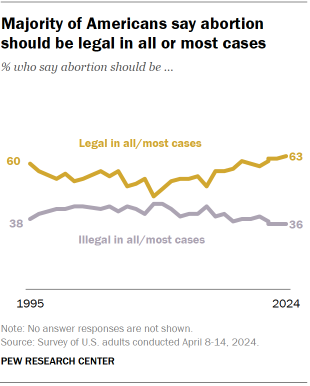
About six-in-ten (63%) say abortion should be legal in all or most cases. This share has grown 4 percentage points since 2021 – the year prior to the 2022 decision in Dobbs v. Jackson Women’s Health Organization that overturned Roe.
The new Pew Research Center survey, conducted April 8-14, 2024, among 8,709 adults, surfaces ongoing – and often partisan – divides over abortion attitudes:
- Democrats and Democratic-leaning independents (85%) overwhelmingly say abortion should be legal in all or most cases, with near unanimous support among liberal Democrats.
- By comparison, Republicans and Republican leaners (41%) are far less likely to say abortion should be legal in all or most cases. However, two-thirds of moderate and liberal Republicans still say it should be.
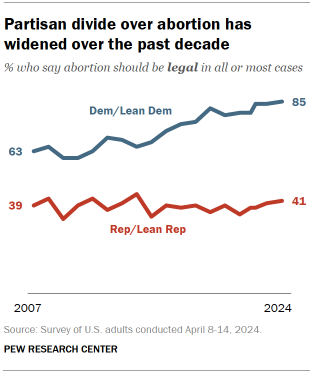
Since before Roe was overturned, both parties have seen a modest uptick in the share who say abortion should be legal.
As in the past, relatively few Americans (25%) say abortion should be legal in all cases, while even fewer (8%) say it should be illegal in all cases. About two-thirds of Americans do not take an absolutist view: 38% say it should be legal in most cases, and 28% say it should be illegal in most cases.
Related: Americans overwhelmingly say access to IVF is a good thing
Women’s abortion decisions
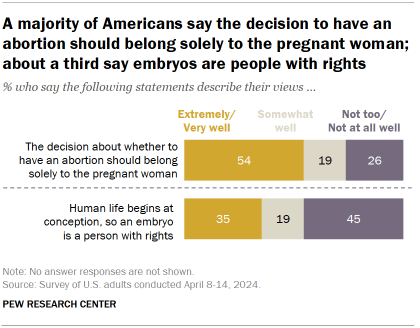
A narrow majority of Americans (54%) say the statement “the decision about whether to have an abortion should belong solely to the pregnant woman” describes their views extremely or very well. Another 19% say it describes their views somewhat well, and 26% say it does not describe their views well.
Views on an embryo’s rights
About a third of Americans (35%) say the statement “human life begins at conception, so an embryo is a person with rights” describes their views extremely or very well, while 45% say it does not describe their views well.
But many Americans are cross-pressured in their views: 32% of Americans say both statements about women’s decisions and embryos’ rights describe their views at least somewhat well.
Abortion access
About six-in-ten Americans in both parties say getting an abortion in the area where they live would be at least somewhat easy, compared with four-in-ten or fewer who say it would be difficult.
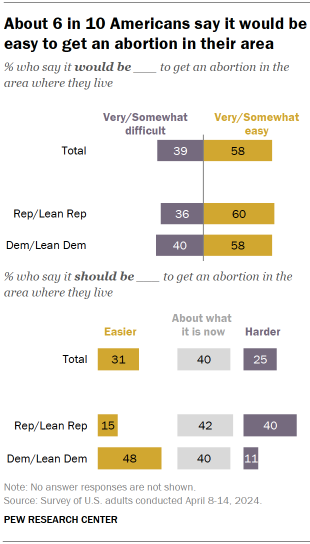
However, U.S. adults are divided over whether getting an abortion should be easier or harder:
- 31% say it should be easier for someone to get an abortion in their area, while 25% say it should be harder. Four-in-ten say the ease of access should be about what it is now.
- 48% of Democrats say that obtaining an abortion should be easier than it is now, while just 15% of Republicans say this. Instead, 40% of Republicans say it should be harder (just 11% of Democrats say this).
As was the case last year, views about abortion access vary widely between those who live in states where abortion is legal and those who live in states where it is not allowed.
For instance, 20% of adults in states where abortion is legal say it would be difficult to get an abortion where they live, but this share rises to 71% among adults in states where abortion is prohibited.
Medication abortion
Americans say medication abortion should be legal rather than illegal by a margin of more than two-to-one (54% vs. 20%). A quarter say they are not sure.
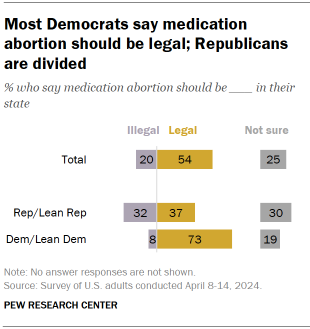
Like opinions on the legality of abortion overall, partisans differ greatly in their views of medication abortion:
- Republicans are closely split but are slightly more likely to say it should be legal (37%) than illegal (32%). Another 30% aren’t sure.
- Democrats (73%) overwhelmingly say medication abortion should be legal. Just 8% say it should be illegal, while 19% are not sure.
Across most other demographic groups, Americans are generally more supportive than not of medication abortion.
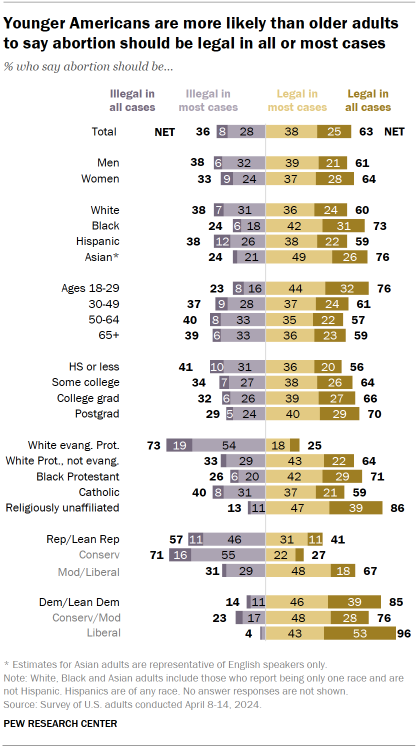
Across demographic groups, support for abortion access has changed little since this time last year.
Today, roughly six-in-ten (63%) say abortion should be legal in all (25%) or most (38%) cases. And 36% say it should be illegal in all (8%) or most (28%) cases.
While differences are only modest by gender, other groups vary more widely in their views.
Race and ethnicity
Support for legal abortion is higher among Black (73%) and Asian (76%) adults compared with White (60%) and Hispanic (59%) adults.
Compared with older Americans, adults under 30 are particularly likely to say abortion should be legal: 76% say this, versus about six-in-ten among other age groups.
Those with higher levels of formal education express greater support for legal abortion than those with lower levels of educational attainment.
About two-thirds of Americans with a bachelor’s degree or more education (68%) say abortion should be legal in all or most cases, compared with six-in-ten among those without a degree.
White evangelical Protestants are about three times as likely to say abortion should be illegal (73%) as they are to say it should be legal (25%).
By contrast, majorities of White nonevangelical Protestants (64%), Black Protestants (71%) and Catholics (59%) say abortion should be legal. And religiously unaffiliated Americans are especially likely to say abortion should be legal (86% say this).
Partisanship and ideology
Democrats (85%) are about twice as likely as Republicans (41%) to say abortion should be legal in all or most cases.
But while more conservative Republicans say abortion should be illegal (76%) than legal (27%), the reverse is true for moderate and liberal Republicans (67% say legal, 31% say illegal).
By comparison, a clear majority of conservative and moderate Democrats (76%) say abortion should be legal, with liberal Democrats (96%) overwhelmingly saying this.
Views of abortion access by state
About six-in-ten Americans (58%) say it would be easy for someone to get an abortion in the area where they live, while 39% say it would be difficult.
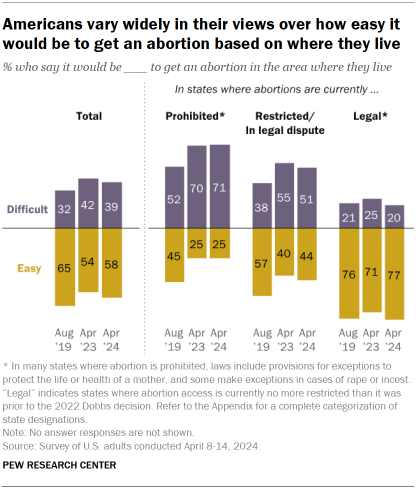
This marks a slight shift since last year, when 54% said obtaining an abortion would be easy. But Americans are still less likely than before the Dobbs decision to say obtaining an abortion would be easy.
Still, Americans’ views vary widely depending on whether they live in a state that has banned or restricted abortion.
In states that prohibit abortion, Americans are about three times as likely to say it would be difficult to obtain an abortion where they live as they are to say it would be easy (71% vs. 25%). The share saying it would be difficult has risen 19 points since 2019.
In states where abortion is restricted or subject to legal challenges, 51% say it would be difficult to get an abortion where they live. This is similar to the share who said so last year (55%), but higher than the share who said this before the Dobbs decision (38%).
By comparison, just 20% of adults in states where abortion is legal say it would be difficult to get one. This is little changed over the past five years.
Americans’ attitudes about whether it should be easier or harder to get an abortion in the area where they live also varies by geography.

Overall, a decreasing share of Americans say it should be harder to obtain an abortion: 33% said this in 2019, compared with 25% today.
This is particularly true of those in states where abortion is now prohibited or restricted.
In both types of states, the shares of Americans saying it should be easier to obtain an abortion have risen 12 points since before Roe was overturned, as the shares saying it should be harder have gradually declined.
By comparison, changes in views among those living in states where abortion is legal have been more modest.
While Americans overall are more supportive than not of medication abortion (54% say it should be legal, 20% say illegal), there are modest differences in support across groups:
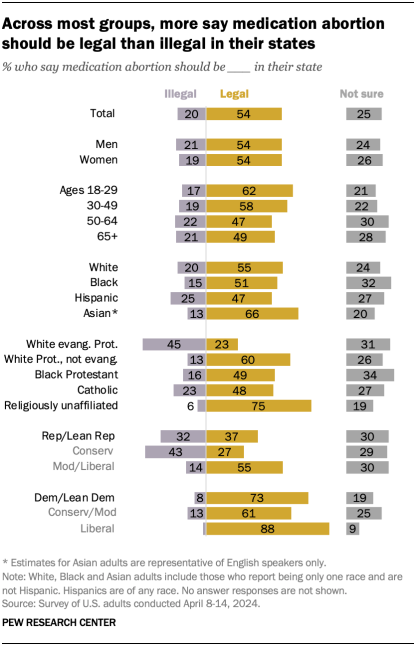
- Younger Americans are somewhat more likely to say medication abortion should be legal than older Americans. While 59% of adults ages 18 to 49 say it should be legal, 48% of those 50 and older say the same.
- Asian adults (66%) are particularly likely to say medication abortion should be legal compared with White (55%), Black (51%) and Hispanic (47%) adults.
- White evangelical Protestants oppose medication abortion by about two-to-one (45% vs. 23%), with White nonevangelicals, Black Protestants, Catholics and religiously unaffiliated adults all being more likely than not to say medication abortion should be legal.
- Republicans are closely divided over medication abortion: 37% say it should be legal while 32% say it should be illegal. But similar to views on abortion access overall, conservative Republicans are more opposed (43% illegal, 27% legal), while moderate and liberals are more supportive (55% legal, 14% illegal).
Just over half of Americans (54%) say “the decision about whether to have an abortion should belong solely to the pregnant woman” describes their views extremely or very well, compared with 19% who say somewhat well and 26% who say not too or not at all well.
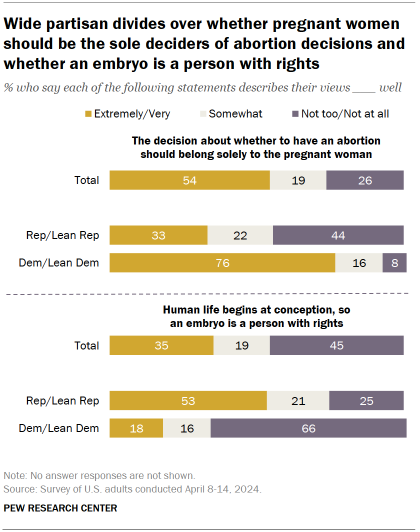
Democrats (76%) overwhelmingly say this statement describes their views extremely or very well, with just 8% saying it does not describe their views well.
Republicans are more divided: 44% say it does not describe their views well while 33% say it describes them extremely or very well. Another 22% say it describes them somewhat well.
Fewer Americans (35%) say the statement “human life begins at conception, so an embryo is a person with rights” describes their views extremely or very well. Another 19% say it describes their views somewhat well while 45% say it describes them not too or not at all well.
(The survey asks separately whether “a fetus is a person with rights.” The results are roughly similar: 37% say that statement describes their views extremely or very well.)
Republicans are about three times as likely as Democrats to say “an embryo is a person with rights” describes their views extremely or very well (53% vs. 18%). In turn, Democrats (66%) are far more likely than Republicans (25%) to say it describes their views not too or not at all well.
Some Americans are cross-pressured about abortion
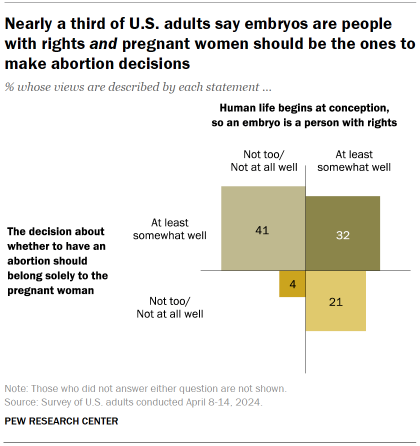
When results on the two statements are combined, 41% of Americans say the statement about a pregnant woman’s right to choose describes their views at least somewhat well , but not the statement about an embryo being a person with rights. About two-in-ten (21%) say the reverse.
But for nearly a third of U.S. adults (32%), both statements describe their views at least somewhat well.
Just 4% of Americans say neither statement describes their views well.
Sign up for our weekly newsletter
Fresh data delivery Saturday mornings
Sign up for The Briefing
Weekly updates on the world of news & information
- Partisanship & Issues
Support for legal abortion is widespread in many places, especially in Europe
Public opinion on abortion, americans overwhelmingly say access to ivf is a good thing, what the data says about abortion in the u.s., nearly a year after roe’s demise, americans’ views of abortion access increasingly vary by where they live, most popular, report materials.
1615 L St. NW, Suite 800 Washington, DC 20036 USA (+1) 202-419-4300 | Main (+1) 202-857-8562 | Fax (+1) 202-419-4372 | Media Inquiries
Research Topics
- Age & Generations
- Coronavirus (COVID-19)
- Economy & Work
- Family & Relationships
- Gender & LGBTQ
- Immigration & Migration
- International Affairs
- Internet & Technology
- Methodological Research
- News Habits & Media
- Non-U.S. Governments
- Other Topics
- Politics & Policy
- Race & Ethnicity
- Email Newsletters
ABOUT PEW RESEARCH CENTER Pew Research Center is a nonpartisan fact tank that informs the public about the issues, attitudes and trends shaping the world. It conducts public opinion polling, demographic research, media content analysis and other empirical social science research. Pew Research Center does not take policy positions. It is a subsidiary of The Pew Charitable Trusts .
Copyright 2024 Pew Research Center

COMMENTS
Find a relevant and compelling medical research topic for your next paper or clinical study from this list of 77 topical and in-demand ideas. Explore exciting new topics, controversial topics, and medical student topics in various fields of study.
The New England Journal of Medicine (NEJM) is a weekly general medical journal that publishes new medical research and review articles, and editorial opinion on a wide variety of topics of ...
22 Paramedic Research Paper Topics. 23 Surgery Research Topics. 24 Radiology Research Paper Topics. 25 Anatomy and Physiology Research Paper Topics. 26 Healthcare Management Research Paper Topics. 27 Medical Ethics Research Paper Topics. 28 Conclusion. In such a complex and broad field as medicine, writing an original and compelling research ...
Find over 100 healthcare research topic ideas across various fields, such as allopathic medicine, alternative medicine, dentistry, and more. Learn how to choose a strong research topic and get tips on writing a dissertation or thesis.
21,957. 20,687. Explore the latest in medicine including the JNC8 blood pressure guideline, sepsis and ARDS definitions, autism science, cancer screening guidelines, and.
Heat exposure induced risks of preterm birth mediated by maternal hypertension. Findings from a multicenter study of 197,080 singleton live births in China show maternal hypertension as a mediator ...
Medical Research Topic Ideas. Medical Research Topic Ideas are as follows: The efficacy of mindfulness meditation in reducing symptoms of depression and anxiety. The effects of vitamin D supplementation on bone health in postmenopausal women. The impact of social media on body image and eating disorders in adolescents.
Medical research involves research in a wide range of fields, such as biology, chemistry, pharmacology and toxicology with the goal of developing new medicines or medical procedures or improving ...
PubMed is a comprehensive database of biomedical literature from various sources, including MEDLINE, life science journals, and online books. You can search for citations, access full text content, and explore topics related to health, medicine, and biology. PubMed also provides advanced search options and tools for researchers and clinicians.
TOPICS. AI in Medicine; Climate Crisis and Health; ... Research; Reviews; Clinical Cases; Perspective; Commentary; ... The content of this site is intended for health care professionals.
Medical Research Paper Topics. This page provides a comprehensive list of medical research paper topics divided into 20 categories, each with 10 unique subjects. The categories span across various subfields, including anatomy and physiology, diseases, epidemiology, health and fitness, health disparities, healthcare, kinesiology, mental health ...
Recent Advances in Diagnostic and Therapeutic Strategies Driven by Connexin Biology. Andres Tittarelli. Mauricio Antonio Retamal. Fabio Mammano. A multidisciplinary journal which advances our medical knowledge. It supports the translation of scientific advances into new therapies and diagnostic tools that will improve patient care.
Here, the authors investigate the fluctuations of physiological indices along aging trajectories and observed a characteristic decrease in the organism state recovery rate. Timothy V. Pyrkov ...
Read the latest research on a wide variety of current medical topics, ranging from birth control and human biology to gene therapy and stem cells. Updated daily.
The findings suggest that people can learn to reduce the brain activity causing some types of chronic pain that occur in the absence of injury or persist after healing. 2021 Research Highlights — Basic Research Insights >>. NIH findings with potential for enhancing human health include new drugs and vaccines in development for COVID-19 ...
Arrhythmia, cardiomyopathy, heart failure, preventative cardiology and vascular topics research. Heart Institute. Biomechanics research, gait and mobility disorders, swallowing dysfunction research. Department of Physical Medicine and Rehabilitation. Brain tumor, MS, pediatric neurosurgery and transverse myelitis research.
With NIH support, scientists across the United States and around the world conduct wide-ranging research to discover ways to enhance health, lengthen life, and reduce illness and disability. Groundbreaking NIH-funded research often receives top scientific honors. In 2021, these honors included Nobel Prizes to five NIH-supported scientists.
Medical research topics are the ideas or concepts related to health and medicine. They often explore new treatments, developments in diagnosis, prevention of illnesses, or even the effects of lifestyle choices. The scope of topics in medicine is vast and can include such aspects: Clinical medicine. Biomedical research.
Additionally, we will outline the crucial elements that every health-related research paper should incorporate. Furthermore, we've compiled a comprehensive list of 300+ health-related research topics for medical students in 2023. These include categories like mental health, public health, nutrition, chronic diseases, healthcare policy, and more.
151+ Public Health Research Topics [Updated 2024] The important area of public health research is essential to forming laws, influencing medical procedures, and eventually enhancing community well-being. As we delve into the vast landscape of public health research topics, it's essential to understand the profound impact they have on society.
Official website of the National Institutes of Health (NIH). NIH is one of the world's foremost medical research centers. An agency of the U.S. Department of Health and Human Services, the NIH is the Federal focal point for health and medical research. The NIH website offers health information for the public, scientists, researchers, medical professionals, patients, educators,
Health research entails systematic collection or analysis of data with the intent to develop generalizable knowledge to understand health challenges and mount an improved response to them. The full spectrum of health research spans five generic areas of activity: measuring the health problem; understanding its cause(s); elaborating solutions; translating the solutions or evidence into policy ...
CDC conducts and publishes research on the social determinants of health (SDOH). This page offers a searchable list of recent peer-reviewed articles written by CDC researchers on various SDOH topics. These are organized according to the Healthy People 2030 place-based framework:
The way to get there, according to a number of speakers at the symposium, is public-private partnership, such as that being modeled through the recent White House Executive Order on the Safe, Secure, and Trustworthy Development and Use of Artificial Intelligence and the Coalition for Health AI, or CHAI. "The public-private partnerships [with] the most potential are [between] academia, the ...
Even as she and others conduct more research on this topic, Havemann said institutions can and should already be taking steps to provide better support for first-generation medical students.
Vegetarian and vegan diets are generally associated with better status on various medical factors linked to cardiovascular health and cancer risk, as well as lower risk of cardiovascular diseases ...
Innovations in perinatal care, gender affirming-care and improving pregnancy outcomes for women with fibroids are among the topics UCSF clinicians will discuss at the American College of Obstetricians and Gynecologists (ACOG) 2024 Annual Clinical and Scientific Meeting, May 17-19, in San Francisco.The theme of this year's conference is "Pathways to Progress," and features novel research ...
A simmering issue — New research shows gas stove emissions contribute to 19,000 deaths annually California is considering a law that would require warning labels on gas stoves.
The new Pew Research Center survey, conducted April 8-14, 2024, among 8,709 adults, surfaces ongoing - and often partisan - divides over abortion attitudes: Democrats and Democratic-leaning independents (85%) overwhelmingly say abortion should be legal in all or most cases, with near unanimous support among liberal Democrats.